#and as i said last night… he has an oedipal complex
Explore tagged Tumblr posts
Text
I actually get very frustrated by people who read Dreaming of You and ask WHYYYY is Derek immediately intrigued by Sara???
Because the book doesn’t have to be for you, but it literally has a moment early on where Derek is like “why does this woman intrigue me so? Oh right, because she shot and killed a man in the street and saved my life thirty seconds after first seeing me”
#romance novel blogging#it’s right there!!! in the text!!!!#and from there i think he finds her can do attitude and mixture of like#do gooder and adrenaline junkie vibes#both charming and hot#and as i said last night… he has an oedipal complex#lol i find the criticism of sara from a WHY HER pov so boring
9 notes
·
View notes
Text
Love and Medicine ~ 12
MASTERLIST

< previous chapter
Word Count: 2,815ish
Summary: You are still trying to cope with the fact that Steve’s married. (Read note at the end of the chapter.)
I do not own Grey’s Anatomy or Marvel.

You and Natasha eventually found your way back to your house and into your bedroom’s adjoining bathroom. Natasha was in the bathtub as you laid on the floor.
“It's not us. It's them,” you said. “Them and their stupid boy penises. They didn't tell me they had a wife. They gave absolutely no warning that they were going to break up with you.”
“It's not that Banner broke up with me,” Natasha began. “It's how he broke up with me. Like it was business. Like it was a business transition like he's the boss of me!”
“He is the boss of you.”
“And what's worse is that I care.”
"I'm gonna throw up again.” You moved so that you were leaned over the toilet bowl. "No. Wait. False alarm.”
“Look, the problem is estrogen.”
“No, the problem is tequila.”
“I used to be all business, and then he goes and gets me pregnant.”
“With the stupid boy penis.”
“Now, I'm having hormone surges. He ruined me. I'm ruined. He turned me into this fat, stupid, pregnant girl. Who cares! Estrogen!”
Having heard the commotion from your bathroom, Val, Scott, and Clint found themselves standing in the doorway.
“Penises,” you stated. “Penises Val.”
“Estrogen, Scott. Estrogen,” Nat added.
“Okay…” Scott said, looking around. “What did I miss?”
“I came home to full on vomit drama,” Val explained. “Apparently she dumped Derek and her—“ Val pointed Nat’s way. “She’s been sleeping with Banner!”
“What?”
“So you really broke up with Rogers?” Clint asked.
“I feel empty,” you responded.
“Two hours of vomiting will do that to you,” Val said with a shrug.
“You’re lucky,” Nat added. “I feel pissed off.”
~~~
Arriving in the parking garage, you could clearly see Steve waiting for you. Getting out of your car, you slammed the door as he came closer.
“Stop,” you growled at him.
“What?” Steve questioned, pretending to be all innocent.
“You're stalking me. Stop it.” You continued into the building with Steve following you.
“Did we not communicate last night?”
“Yes.”
“Did you hear what I was saying?”
“Your wife screwed your best friend.”
“And then from that point on she no longer existed to me anymore.”
“You had marital amnesia?”
“No.” Steve reached out and grabbed your arm, successfully stopping you. “Come on I bared my soul to you last night.”
“It's not enough.”
“How can that be not enough?”
“When you waited 2 months to tell me and I had to find out by her showing up, all leggy and fabulous and telling me herself, you pulled the plug. I'm a sink with an open drain. Anything that you say runs right out. There is no enough.” You pulled away hurrying inside with your friends after you.
“She probably could've picked a better metaphor,” Clint commented.
“Give her a break,” Scott said. “She’s got a hangover.”
With a huff, Steve followed. Tony, who was also coming in, quickly caught up to him.
“Dr. Rogers!” He called.
“Dr. Stark,” Steve replied.
“We have an organ donor coming in this afternoon. We're doing a harvest.”
“Commendable, but—“
“In OR one at four.”
“I’m in OR one at four.”
“Your surgery is non-critical.”
“You can’t bump me!”
“As Chief, I can. You’ll be first up tomorrow.”
“Interim Chief. Bump somebody else!”
“You’re in the OR we need.”
“Why can’t the harvest be done somewhere else?”
“Cause the donor’s coming in from a small facility. We have the location, the airport nearby and the staff. Your surgery is rescheduled.” Then Tony turned, heading away.
“I’m not done talking about this, Stark!”
“Well, I am! See ya around Rogers!”
~~~
Rounds weren’t too bad, especially because you successfully ignored both Peggy and Steve. It even became slightly better when Gamora called you in for a bowel obstruction. Except the guy wouldn’t tell you what he ingested.
“You know, Mr. Sanders, it would be easier if you just told us what you ingested,” you pried, taking him to radiology. “We’ll know anyone, once we see the films.”
“You’re beautiful, you know that?” Mr. Sanders responded.
“Mr. Sanders, whatever you’ve ingested could kill you. Are you sure you don’t just want to tell me?”
“It might offend you.”
“It might? Is it drugs?”
“No.”
“Mr. Sanders.”
“It’s not drugs, I promise.”
“Well, good, I’m glad.”
“I… Nope, not going to tell you.”
“Fine by me. We just reached radiology, so I’m going to find out anyway.”
It wasn’t long before Mr. Sanders was back in his room and the radiologist had found you with the scans.
“It’s drugs,” the radiologist stated handing the scans over to you. “Looks like at least 13 small balloons in the bowel. My guess, cocaine.”
“Hmm,” you hummed, holding up the scans up to the light.
They didn’t totally look like balloons, so you weren’t completely convinced. Before you made any judgement calls, you found Gamora.
“It’s drugs,” you told her, handing her the scans.
“Stupid, stupid, stupid,” she muttered, placing the scans onto a screen. “One burst and he’s dead in minutes. Okay, what do we do?”
“Run his bowel.”
“And what does that mean?”
“Running the bowel entails removing all 36 feet of the intestine from the body cavity, hand searching for the balloons and then cutting them out.”
“Good. Book an OR and get two other interns on board, need all the hands we can get.”
“Dr. Gamora,” Y/N called as Gamora tired to leave.
“Yes?”
“Are you sure they’re balloons?”
“You have reason to believe they’re not?”
“Well, the more I look the more I realize that this one,” you pointed to the scans, “has a face.” Gamora looked closer. “And this one… they all do.”
“I’ll be damned. They’re Barbies. He swallowed 13 Barbie doll heads.”
~~~
“Barbie heads?” Scott repeated after you told him, Natasha, and Peter what happened.
“Yeah,” you responded. “And Gamora wants two of you to join us in surgery.”
“I’m already booked.”
“I can do it,” Natasha said.
“Me too,” Peter said.
“My foster mothers used to buy me Barbie dolls. All sorts of them.”
“I also wanted one,” you added. “My parents never let me.”
“I dissected them. Cut off their arms, shaved their heads.”
“You’re a little scary,” Scott stated. “You know that?”
“I try.”
“Sounds like there’s a sick and twisted story behind this,” Peter said.
“No, they’re sexist, distorted devil toys that create unrealistic expectations carrying to the porn driven minds of men,” Natasha expressed.
“You swallow a bitter pill this morning, Romanoff?” Gamora questioned, coming up to you interns. “They’re just dolls. Quill, call for a psych consult. Then see if he has family.”
“Should I still book the OR?” You wondered.
“Blocked bowels become necrotic bowels. Check with Dr. Stark, see if we can bump someone. Those Barbies gotta come out today.”
~~~
Gamora had given Clint the impossible assignment to revive a patient. And, unfortunately for him, he was stuck with Laura.
“Any family members waiting?” He asked as he stapled up the man’s chest.
“Still trying to reach them,” Laura responded.
“Good. Well, I mean, not good that we haven’t reached anyone. Good that I don’t have to, uh…”
“It’s always hard.”
“Yeah.”
“I’m sorry about Peter.”
“It’s fine. It’s good. No need to talk about it.”
“You do understand that I had sex with him before you, not during, right? Because when you and I were together—“
“I understand.”
“I just wanted to clear the air.”
“Oh, it’s clear. Perfectly clear… okay.”
“Okay.”
“Okay.”
“And about the syphilis—“
“We really on’t have to talk about it.”
“Which is, I mean, I didn’t know I had it. I definitely should have, I’m a nurse. Like, there was a sore and I was all itchy.”
“Okay!” He backed away almost knocked the tray beside him over. “You know I, uh, got it. You know things happen.” He moved to the door, away from Laura.
“They really do. Things you wish you could change.”
Clint’s pager rang and he looked down. “It’s the Chief, I gotta take this.”
“Sure… Clint.”
“Yes?”
“You have to call it.”
“Call it?”
“Him.”
“Oh, yeah.” He looked at his watch. “Time of death 1:37.” He turned to leave again.
“And, Clint,” he paused, not turning around this time, “if we could, I wouldn’t mind trying again.”
“Maybe… some day…”
~~~
Tony was walking down the hall with Maria, going over the donor surgery.
“When is the donor getting here?” He asked.
“Should be here at 3. Harvest team’s not heir way in.”
“I also need to touch base with the transplant center about a patient here getting his son’s liver.”
You walked up. “Dr. Stark,” you called. “Dr. Gamora needs an OR and they’re all booked.”
“For?”
“An emergent bowel obstruction.” She handed him the scans.
“Drugs?”
“Barbie heads. 13 of them.”
“Seriously?”
“Yes.”
Maria looked at the films. “I can see their little faces,” she commented. “That patient must have serious issues.”
“Hill, can your hernia in 1 be bumped?” Tony asked.
“Most likely.”
“Do it.”
“On it.” Maria left.
“Thank you, Dr. Stark,” you said, moving to go.
Tony grabbed your wrist and stopped you. “Y/N, are you okay?”
“I’m fine.”
“Don’t lie.”
“I’m not. I’m really fine.” And you pulled away.
~~~
You, Gamora, and a doctor from psych were currently discussing the psych evaluation on Mr. Sanders.
“He’s not talking. It could be pica,” the psych doctor stated. “Doubtful for a man his age. Maybe an oedipal complex or an idolization of the doll as his partners. Or it could be that he simply enjoys it.”
“Now I've seen a lot of strange things in strange places but how does he enjoy this?” Gamora questioned.
“He’d enjoy it when they came out.”
“I didn’t need to hear that.”
“Dr. L/N,” Peggy called as she walked back. “May I speak with you for a moment?” You looked at Gamora for help.
“Don’t look at me. I’m not gonna help you.”
With a sigh, you went to Peggy and the two of you began walking away.
“I assume he told you why he left me,” she said.
Annoyed, you stopped in front of her. “Look, Dr. Rogers, will all do respect, this has nothing to do with me,” you said.
“Really? So you didn’t take him back. Good girl.”
“And int he future, I’d appreciate it if we could keep our relationship strictly professional.” You walked away.
“Y/N!” You stopped and turned back slightly to give Peggy your attention. “Sometimes people do desperate things to get someone’s attention.” You shook your head and started walking again. “There are two sides to every story!”
~~~
You, Peter, and Scott arrived at lunch first. The three of you picked a large table farthest away from the others.
“Look what I went out and got,” Peter said, putting a grocery bag on the table. Opening the bag, he revealed 13 headless Barbie dolls.
“Really, Quill?” You wondered.
“That’s gross,” Scott cringed.
“I think it’s funny,” Peter said, smiling, as he laid them out on the table.
“Of course you do,” you muttered.
“Oh! That is sick!” Clint commented as him, Natasha, and Val walked up.
“Who would do that?” Val asked. They looked to see Peter smiling.
“Oh, look!” Natasha said, picking up a doll. “See Barbie fly.” She throw it at Peter, who ducked.
“Hey, Clint,” Laura greeted, walking by.
“Hey,” he replied, sitting down at not looking at you. The interns all gave him a look. “What?”
“She was trying to make up with you, Clint,” you told him. “You should go eat with her.”
“No, I shouldn’t…. No.”
“She’s cute and she likes you,” Scott said.
“You shouldn’t let a little syph get in the way of that,” Val added.
“It’s not the syph,” Clint insisted.
“It’s so the syph,” Natasha said.
“It’s not the syph!”
“Then what is it?” Val asked. Clint didn’t answer, looking down. “Oh.”
“What?” You wondered. Clint simply shrugged. “What is it?”
“There’s this other girl,” Val responded.
“Val!” Clint exclaimed.
“Other girl?” Natasha questioned. “You have another girl?!”
“He hasn’t told her that he likes her yet,” Val said.
“Val!” Clint exclaimed again. “This isn’t high school.”
“Clint has a little crush.”
“I do not… It’s a thing, a very personal thing. One day I would like to build on this thing with this other girl—woman. She’s all woman.”
“What are you doing, Clint?” You asked, slightly harsh.
“I-I don’t—“
“With Laura. What are you doing with her?”
“Oh. Nothing.”
“You’re letting her think you’re emotionally available. You’re letting her think she has a chance. And there is nothing worse in the world than think you have a chance when you really don’t!”
“Y/N is right,” Natasha said. “Tell her that there’s someone else. And tell her why, Clint. I mean— I mean at least give her the chance to have some feelings about it!”
“Why are you both yelling at me?” Clint asked.
“Because of the estrogen Clint! Because of all the estrogen!”
~~~
“Was it an act of desperation?” You asked Mr. Sanders as you headed into his surgery.
“Not at all,” he replied.
“Something to attract attention?”
“No.”
“I’m just trying to understand here. Why 13 doll heads?”
“Well because 14 would’ve been too much.”
You cringed and helped the nurses get Mr. Sanders on the operating table before going to scrub. It was Gamora, you, Peter, Val, and Natasha in the surgery.
“I think it has something to do with his mother,” Val suggested. “Maybe she always wanted a girl and gave him Barbie dolls because of it.”
“Ah, ah, I’ve got another one,” Peter said, showing the head in the intestine.
“Uh!” You groaned.
“Doyen clamps to Romanoff,” Gamora ordered. “L/N, push the head up to the incision.” You began to squeeze the doll head up through the intestine.
“Maybe his mother looked like a Barbie doll and he’s into voodoo,” Peter suggested. “Instead of sticking pins in… well…”
Dr. Stark entered the OR. “You good here?” He asked Gamora, observing you though.
“Couple more heads to go,” Gamora responded.
“Then L/N stay here. All you other interns I need you on other cases.”
You met Tony’s eyes before he walked out of the OR.
~~~
Clint was put on a case with Steve. They were about to go separate ways so that Clint could run labs, when Steve stopped. He looked back at Clint.
“Is she okay?” Steve asked.
“Who?” Clint questioned. He looked up at Steve and knew. “Y/N? She’s… hanging in there.”
“Look out for her.”
“I will.”
Then Steve walked away. Before Clint could get really far, Laura found him.
“The family of the guy we worked on this morning is here,” she told him.
“Thanks for letting me know,” Clint responded.
“Clint, I just want an answers, so that I can get on with my life if I need to.”
“Look, maybe I’m not over the Peter thing yet or the syph thing… And I really want to be, but there’s also another girl. And, to me, it doesn’t matter there’s this other guy and frankly I wouldn’t care if she gave me the Ebola virus… I like you, Laura, I really do. Just… I—“
“You’re going to need some time.”
“Yeah.” He kissed her forehead. “Thank you for understanding.”
~~~
Steve was standing alone in the elevator when Peggy walked in, both dressed to leave.
“Just when the day was improving,” he murmured.
“You told Y/N what happened?” Peggy asked.
“I did. Why? What did you tell her?”
“That sometimes people do desperate things to attract attention.”
“What? Wow. That's your side of this? That I didn't pay you enough attention. Is that you were thinking when you got naked with my best friend?”
Peggy reached over and stopped the elevator. "No, by that point I wasn't thinking at all Steve. By that point I was just scratching an itch. We got successful you and me. We got busy and we got lazy. We didn't even bother to fight any more Steve. And Bucky was there and I missed you. And now I'm sorry.” Steve restarted the elevator. “I’m more sorry than you can possibly imagine. But at least I'm talking to you about it.” The doors opened and Steve walked out. “Steve.”
“I’m a sink with an open drain, honey.”
~~~
“Did you get them all?” Mr. Sanders asked. You were checking on him, post-surgery.
“Yes,” you replied. “It wasn’t easy or very pleasant. How do you feel?”
“Empty… I feel empty now.”
“Yeah. I've been feeling a little bit of that myself lately.”
“I can tell.”
“Mr. Sanders, why does eating doll heads fill you up? What’s the satisfaction?”
“Do you really want to know?”
“Would it be too much information?”
“Might.”
“Maybe I’m better left in the dark.”
next chapter >
I leave for Disney World in a week. It is the last big family vacation that I will be on for a while. Because of that, I will not be on tumblr March 19th through March 24th. I will actually be deleting the app so that it’s not a distraction.
Most likely, nothing will be posted during that time. If something is, it will have been queued up. Things that are posted while I’m out of town will not have tag lists attached. I will put this note in all the fic posts until then.
So do not come at me for spending time with my family instead of including the tag list. (I say that knowing that people won’t care and still come at me.... be respectful and get over yourself.)
If you want to be added to the tag list, please dm me or send in an ask.
#steve rogers x reader#steve rogers imagine#Steve Rogers#steve rogers fanfiction#steve rodgers x reader#steve rodgers imagine#the avengers x reader#avengers x reader#marvel x reader#marvel imagine#marvel imagines#greys anatomy au#Marvel AU#marvel fanfiction
120 notes
·
View notes
Text
Reflections of Su XiYan in Scum Villain’s Female Characters
I did not realize it was MXTX ladies week until yesterday. :( So I want to do a post/meta on the amazing women in each novel (not without critique), so let’s start with MXTX’s first one!
Scum Villain’s Self-Saving System, which while it may have more obvious narrative flaws than TGCF or MDZS (it sets up some plot points it kinda drops later, whereas TGCF and MDZS pretty much maximize every single aspect of potential), I actually think is just as rich, clever, and coherent thematically as MXTX’s latter two novels.
The plot points that are dropped, though, are actually almost entirely related to the set up the female characters as deconstructing the idea that they were just things for Original!Luo BingHe to collect. While it does do this to an extent with Su XiYan, Ning YingYing, and Sha HuaLing, it kinda… dropped the arcs halfway through for Ning YingYing and Sha HuaLing, and sets up but never really begins Liu MingYan’s and Qin WanYue’s.

Su XiYan’s arc, though, despite it taking place in the past and being told to us, is entirely about refuting the role the men in her life ascribe to her... and all of the other female characters--all members of Original!Luo BingHe’s harem--represent a part of her. You could get, like, really Oedipal if you wanted to, but I’d rather not beyond simply saying it’s a pattern in stories that is definitely present here. Aspects of her story and character are reflected in each of the women who are love interests in Proud Immortal Demon Way.
Our first refutation of how men treat and categorize Su XiYan is through her foiling with Ning YingYing.

Shen Yuan notes that Shen Jiu sexually harassed Ning YingYing:
the original Shen Qingqiu had designs on Ning Yingying... [he] had dirty thoughts towards his lively and well-behaved disciples. Several times he tried to lay hands on them and almost succeeded at that.
Which is what the Old Palace Master did to Su XiYan:
He turned to focus his stare on Luo Binghe’s quietly sleeping face... nThe Old Palace Master gazed at him for a long while then sighed: “When you close your eyes, you resemble her the most. And also when you’re being cold.”
His eyes traveled over Luo Binghe’s face greedily. If he still had hands, he would have reached out to fondle as well.
However, the Old Palace Master never got anywhere with Su XiYan, because she fell in love with someone else and thereby refutes the idea that she’s his tool. In the original, Ning YingYing is rescued by Luo BingHe in the original. In the novel, Ning YingYing’s arc is about her discovering self-sufficiency. She doesn’t need rescuing from Luo BingHe; she can rescue herself, as is shown when she leads Ming Fan and the other disciples into a fight to protect Shen QingQiu’s honor after his arrest. When someone slaps her, she slaps back, twice--but Shen QingQiu gives her the energy. I would have liked (and think her arc was heading towards) her to grow to be competent on her own as well.
Next, Sha HuaLing.

Sha HuaLing represents TianLang-Jun’s assumptions about Su XiYan: that she was a deceptive seductress who would betray him for her own desires. However, in reality, like Sha HuaLing does in Proud Immortal Demon Way, Su XiYan betrays her race (for her, humanity, for Sha HuaLing, demons) for love.
Sha Hualing was a pure-blooded demon, cruel and ruthless, cunning and artful, but fell irrevocably for Luo Binghe. After getting together with Luo Binghe, don’t even speak about killing for him; she even dared to do an outrageous thing like betraying the demons for him.
Su XiYan, however, was never given the chance to fight back. In the actual novel, Sha HuaLing does much the same (betrays the demons), but Luo BingHe does not love her and she knows it. I think this is a good ending place for Sha HuaLing, assigned to fight against her father in the final battle (which she does), but we’re told rather than shown her development and we’re not told what led to this decision, which is a shame.
Sha HuaLing is perhaps most directly foiled both in Proud Immortal Demon Way and in SVSSS by Qin WanYue.
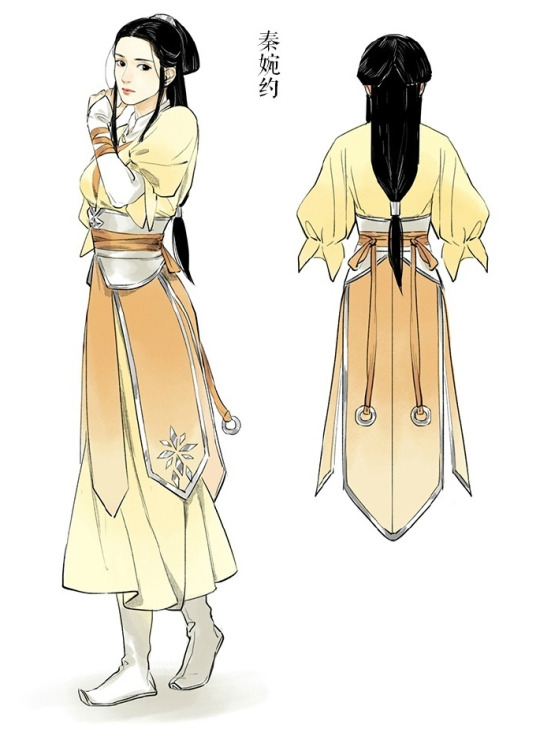
Qin WanYue, much like Su XiYan, is considered the perfect disciple of the Huan Hua Palace. Regarding Su XiYan, it’s noted:
“That woman had shocking talent, was intelligent and sensitive when making decisions, and she had the aura of a tyrant. The Old Palace Master loved and cared for this private disciple. He thought of her as a pearl that should be protected in his hands and trained her to be the next Palace Master of Huan Hua Palace. No matter where he went, he would bring Su Xiyan along with him. The importance that he placed in her was abnormal.”
Qin WanYue’s symbol is a pearl that lights the way.
Luo Binghe picked up Qin Wanyue’s Night Pearl that had fallen to the ground and raised it high, as though it were a beacon. It awakened those who had frozen in place.
Not to mention in the original novel Qin WanYue loses a child in a miscarriage caused by someone else (Sha HuaLing) much like Su XiYan almost lost Luo BingHe when pregnant with him. Qin WanYue clings to Luo BingHe after the loss of her sister as something who might be able to offer her happiness. She’s not much different than Luo BingHe growing up parents and clinging to ShiZun: she who lost her sister and then clings to the person who saved her. But in her case, Luo BingHe does not return her affection, and I really had hoped/ expected her arc to end with her finding her own path.
Qin WanYue is also tasked with an action beneath her (much like Sha HuaLing): taking care of the Little Palace Mistress, the Old Palace Master’s literal daughter and hence another foil to Su XiYan. Her defining trait is her pettiness and cruelty, the latter of which Su XiYan is also said to have been capable of, as she began spending time with TianLang-Jun in an attempt to bring him down.
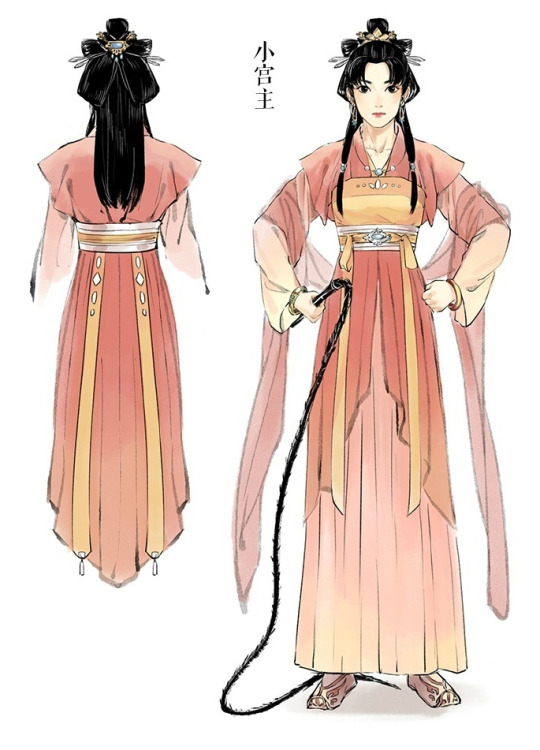
However, the mistress isn’t really set up with the potential for an arc like Qin WanYue is.
From time to time [Qin WanYue] would cast a teary glance at Luo Binghe, as if expecting something...
[Sha HuaLing:] “how many times have you failed to seduce the lord yet still refuse to leave? If you don’t leave that’s fine, but you’re incapable of looking after even a single person. Her cultivation isn’t even as high as yours. You’re her senior martial sister. You didn’t stop her early and didn’t stop her late. All you did was to let her make this unreasonable scene in front of the lord. Who are you putting on this pitiful and wronged appearance for?”
Qin WanYue isn’t weak at all, but she puts on a weak act for Luo BingHe, hoping to attract a rescuer like she needed back then. I initially expected her arc to end with her accepting her strength and moving on form Luo BingHe (and from the little palace mistress). I still think it should have.
And then we have Qiu HaiTang, whom I don’t think is set up as much for development as the others despite having more backstory on her.

Still, Qiu HaiTang she was a woman mistreated and shamed by what had happened with her fiance Shen Jiu--just like Su XiYan was shamed for what happened with TianLang-Jun.
“That’s right, if she hadn’t been so ill-fated as to fall for Tianlang-Jun’s wiles, she would have had such a bright and promising future and be a person of great renown today.”
“I don’t care what fantastic rewards are promised to me━having an affair with a demon and getting knocked up with a monster child is just plain disgusting. This kind of merit, I wouldn’t accept even if it was served to me on a silver platter.”
“Su Xiyan was probably too ashamed to remain, and thus ran away from the sect master.”
The thing is, all these roles--perfect disciple with great potential, brave enough to betray everything for love, endearing and caring, mistreated--none of these really capture the complexity and beauty of who Su XiYan really was... which is represented in Liu MingYan, the noted female counterpart to Luo BingHe, the main female lead. Liu MingYan conceals her face, which is too beautiful to be seen.
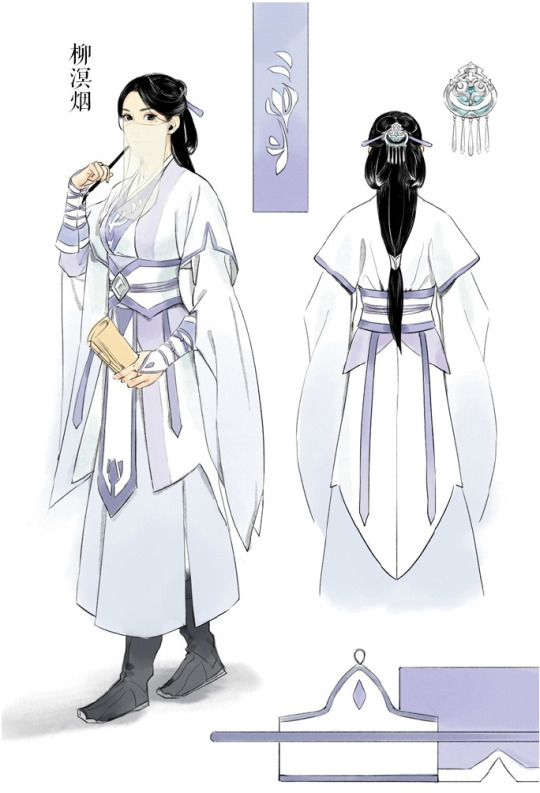
Liu MingYan, like Si XiYan, remains mysterious; Shen QingQiu never sees her face uncovered, and the audience never really gets a clue as to what is going on in her head besides the mention that she cares deeply for her brother. Again, this is something I think could have and should have been developed more; she has the set-up for an arc with her conflict with Sha HuaLing being dazzled by her beauty and with her loyalty to her sect and brother, but it doesn’t go anywhere. She said to be “the number one female lead!” after all, and I think it’s entirely possible for her to maintain her aura of mystery and still... have an arc. Su XiYan did, after all, and she was dead before the novel began.
In the end, no one really can define whom Su XiYan was exactly, because she’s dead. What ultimately mattered, what defined Su XiYan’s legacy, was her final choice to save her son (and yes, it’s fair to critique that it’s again about a man, but it’s her choice). That’s why the story, in its penultimate chapter, has Shen QingQiu telling Luo BingHe:
“Su Xiyan risked her life to give birth to you...
“If I were in her shoes, I would not hesitate to drink [the poison for a fetus] regardless of how lethal it is. Then, after escaping from the water prison, I would absorb it all into my own body. Regardless of how agonizing and horrifying the process is, regardless of the price to be paid, regardless of whether it would be a painful death, I would never let this child suffer any harm.
“This is how I see it. You can take it as just an interpretation because there is no one who can tell you what Su Xiyan was thinking before she breathed her last. But if she really saw you as a disgrace, she didn’t need to do anything more. She could have just lowered you into the Luo River, on the coldest days of the year, in a harsh and frozen landscape━how could you possibly survive?... she also need not use the last of her strength and energy to put you in a wooden basin and push you away to safety…… You don’t even need to wait for someone to save you at all since you would have already become a wandering soul who met his freezing end in Luo River.
He’s healed, and he no longer needs to try to recreate his mother figure in over a thousand beautiful women like he did in the past. He can heal.
Imo, it would have been even more powerful if the women then stepped out of these roles more completely, and became their own people. But I really do like all four of the main women I discussed here, and someday I’ll write more for them.
#scum villain meta#svsss#svsss meta#the scum villain's self-saving system#bingqiu#luo binghe#su xiyan#shen qingqiu#shen yuan#shen jiu#sha hualing#liu mingyan#ning yingying#qiu haitang#qin wanyue#mxtx meta#mxtx#mxtx ladies week
879 notes
·
View notes
Text
Persona (1966) | Directed and Written by Ingmar Bergman
youtube
(preferable trailer over original from Austin Film Society)
Film Intro and Purpose for Page
Heady Times = Heady Films!...and we’re all wearing masks right now, literal and metaphorical. To start off my new page I’m going to begin at the tippy top with Ingmar Bergman’s Persona, the “Mount Everest of Film Analysis”, which has been described as creating even more contradictions when trying to analyze it. It was made in 1965 in Sweden and is commonly in conversation as one of the greatest films of all time. Bergman died at his home where he filmed Persona on July 30, 2007. This was also my first day ever to visit Los Angeles, right before moving here the following month. I remember seeing it on the LA local news while staying at a beach hotel with my Mom. I don’t know how I remember it so clearly but I can see that room now, in my head, and the news anchor looking into the camera. It’s also worth mentioning that Michelangelo Antonioni, the Italian filmmaker, died on the same day. Two giants of cinema. I rewatched Persona late last night and took a copious amount of notes. I first saw this film 7 or 8 years ago and then twice recently. This entry will be more lengthy than future ones because I naturally felt the need to be more specific with this particular film...I wanted to have a fighting chance at semi-understanding it. I will only look something up if absolutely necessary for factual purposes. Although (full disclosure) the “Mount Everest of Film Analysis” title was taken from the first paragraph on the film’s Wikipedia. This was before I decided exhaustive searches about film historians’ perspectives would just be too much for these posts. Instead, I will focus on my unique thoughts and perspective about the film and what I feel is valid.
After filling my head with Persona I went to bed. I then dreamt that I was in a writers’ room with filmmaker Paul Thomas Anderson (who is one of my favorite filmmakers and will turn up on this page soon). We began talking about his film The Master. I remember feeling frustrated in the dream that I couldn’t think of anything clever to say about it in front of him. He told me that films sometimes just fold in together in unexpected ways, almost by luck. This prompted me to finish his sentence by saying that films sometimes generate these unplanned illuminating interpretations that are endless. He agreed with me, which felt good, even though in reality I was speaking for Paul because he was just a character in my dream...or possibly something outside the grasp of my conscious mind spoke for him/me.
So why start with Persona? Why start this page?? Because I am fascinated by the mystery of great films and believe there is transformation and understanding when one attempts to decipher "works of art” like this. Plus, it’s fun for me and a rewarding challenge to complete. Mulholland Drive was my big bang moment (influenced by Persona) and I have been hooked on digging into these type of films ever since. I’m also a filmmaker that has been working on a Short for the past year (which has been grueling) and feel I can improve my own filmmaking abilities by breaking down these masterpieces in my own words. My goal is to attempt not to stray too far from what is objectively being shown while also using my own knowledge of what I think the filmmakers are trying to say...or, even better, DIDN’T know they were trying to say. And I’m sure writing about the metacognitive nature of this particular film will reveal a lot about myself, which is what great cinema inspires.

Enigmatic Opening
The film fades in and we are inside a film projector. Images begin to flash quickly and chaotically. I will mention some below: -A penis. -An animated female character upside down that eventually holds her breasts. -A silent era movie chase scene of a skeleton coming out of a chest, and then dracula chasing a man in his pajamas. He fearfully jumps in bed and throws the covers over himself. Is it just a dream? -A closeup of a sheep being slaughtered, bleeding out. -Screen flashes white to a shot of Jesus’ hand being nailed to the cross, which to me resembles the tarantula that flashed earlier. -Cuts to a quiet forrest, then sharp tops of a metal fence and next a dirty snowpile in front of a building... Why are we being shown this? I believe this opening operates like a dream. Are these images preparing our unconscious for what we see later? It’s impossible to know exactly unless some detailed external commentary is given. I remember reading Roger Ebert saying the sequence was Bergman stating he is creating a new type of cinema, expressing this by starting in the projector and ending in the projector. This never crossed my mind while watching.
-An old woman dead on a table possibly in a morgue, then a man. -A phone rings. The dead women suddenly opens her eyes. -A boy opens his eyes, waking up. He puts on his glasses as the phone continues to ring and opens a book and begins reading. He then looks into the camera at us (a motif for certain moments in the film, especially for Elisabet). -Next, a reverse shot which reveals he is looking at a screen that covers the wall. It’s a striking image as the music crescendoes. The screen reveals what looks to be an unrecognizable woman that keeps blurring and morphing. The boy touches the screen in a way that I interpret as yearning. Then it becomes clear the women’s faces on the screen are the main characters that we will soon meet and spend the film with, Alma and Elisabet. Their faces are blending into one another, but it is still not extremely clear. I had to go back and rewatch this part to verify if it was actually them. “Not extremely clear” is a theme throughout the film. Who is who? What is a dream and what is not? This motif of faces and masks. Insecurities about what to show and what to hide, which I think was my main, simplified takeaway from the movie after the first watch. Predeterminism is also something that keeps popping in my head after watching. Alma cannot hide from Elisabet. Elisabet always seems to know at key moments. The Conscious cannot hide from the Unconscious. The Swiss psychologist Carl Jung was a large inspiration for this film and the term persona is his term in the context aligning with the film.
Then the title page quickly flashes, along with the boy in glasses again, then the two main female characters, all in individual closeups. This film is shot in 4:3 aspect ratio, which is conducive to faces and the two female characters have amazing faces with the help of the naturalistic cinematography of Sven Nykvist. Below is a couple of quotes I found beautiful by Bergman regarding the human face:
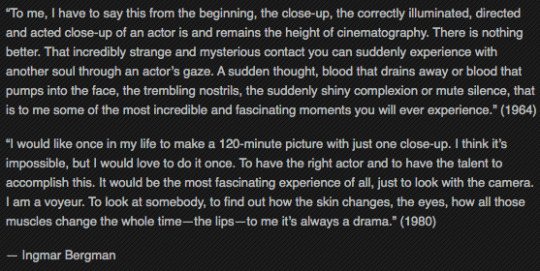
The music is amazing here too at the opening...percussion and xylophone with chaotic crescendos, which seem way ahead of its time.
And is this boy shown, Bergman himself?...putting on his glasses, with childlike curiosity, yearning, awakening to this experience of making this novel film and what it will tell him?

Alma and Elisabet Meet
We are at a hospital. The Doctor informs the Nurse, Alma, that the patient, Elisabet, has stopped speaking. She is an actress that became mute in the middle of a performance on stage playing Electra and has continued not speaking for 3 months. (”Electra Complex” is a Jungian term that is the female version of the Oedipal Complex.) Alma anxiously enters Elisabet’s room and introduces herself saying she’s 25 years old and grew up on a farm in the country. Elisabet looks away. Alma later tells the doctor in the hallway that she can not help her and “may not be up to the task mentally”. In my opinion, Alma’s insecurity with her mental faculties is a huge part of the film, possibly because she’s unaware and/or unwilling to see her full Self. Alma goes back in the room and blurts out that she doesn’t understand films and theatre but has great admiration for artists and is impressed by Elisabet, who then embraces her. Elisabet possibly needed this validation. Alma soon leaves the room after turning on the radio with symphony music. A closeup of Elisabet reveals how deeply she feels this music. Liv Ullmann (actress playing Elisabet) has such deep eyes that are able to convey so much as tears subtly well up. She eventually exhales and turns away from the camera and radio. These moments occur with Elisabet throughout the film where she shows this sensitivity and understanding of something outside of the sphere of what is going on between Alma and herself. For example, soon we see her in the bare hospital room (beautifully and minimally lit) reacting to news coverage of the Vietnam War. The TV shows a monk that has set himself on fire in protest. This backs Elisabet all the way up into the corner of the room, gasping with her hand over her mouth and in closeup it’s evident she feels so much of what’s she’s watching...and I felt it deeply too.

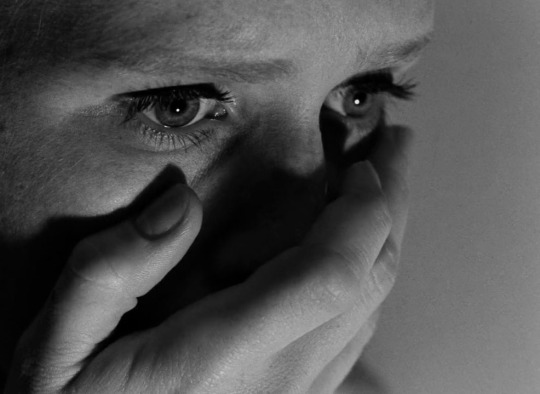
In the scene prior, Alma is shown sitting on her bed in her nightgown (possibly talking to the camera first, then herself) about how she will get married, raise her kids and how everything is “decided” for her, predetermined. Several phrases that she uses during this self-assuring scene: “It is inside of me”, “Already written”, “I don’t even have to think about it.” Which to me, is a stark contrast to who Elisabet is...a mother who has left her family, who does not accept her reality and who wants more. Yet, Alma now is sleepless also, sorting this out aloud, as if coming back into herself because Elisabet has perplexed and disrupted her. Elisabet fascinates her. She admires Elisabet. Elisabet has introduced this mystery into Alma’s life now and is living in her thoughts.
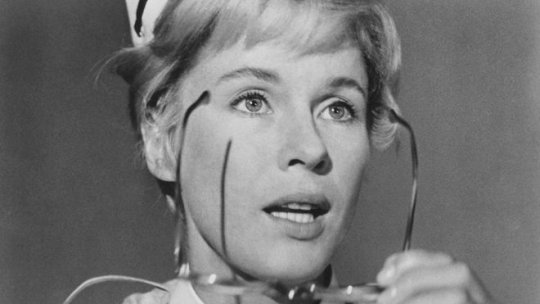
The Doctor Speaks to Elisabet
I’m not sure what others have said about this scene, but in the moment while watching, I found it to be the most revealing, door-opening of the film. I think it is because the Doctor speaks with such clarity and assurance. It is a more literal explanation of what is happening with Elisabet and a lot of the other scenes do not reveal themselves so easily. You have to chew on them a bit. The Doctor is older, integrated, in contrast to the two younger fragmented leads. The Doctor recommends Elisabet and Alma move in to her summer home next to the sea instead of staying at the hospital. She says it will be better for Elisabet there. She then says she understands the chasm inside of Elisabet and also the deep chasm between Elisabet and others. The Doctor continues by saying that this feeling of falseness and lies and the constant hunger to be “unmasked” is causing this paralysis of speech. Elisabet is still, carefully listening. Apparently the Doctor is onto something. The close-up two shot during this scene is also a motif that recurs throughout the film. Sometimes the two shots are not exactly like this but very similar. The Doctor is fully lit. Elisabet is half-lit, in shadow on the side closest to the camera. I wonder if this half-shadow lighting is connected to Jung’s term, shadow. I wouldn’t be surprised if it was a literal, overt expression in the cinematography. The shadow is defined as an unconscious aspect of the personality which the conscious ego does not identify in itself. Jung goes on to say that the shadow is often negative, because it is the least desirable aspects within oneself that has been conveniently ignored or rejected...because it’s uncomfortable to face (no pun intended). This is an accurate description regarding the characters. Alma also displays this rejection of the shadow multiple times that I will point out later. The Doctor then mentions Elisabet should play out this scenario until it is no longer interesting and then she can drop it, like a role. Perhaps the Doctor says this to use a vernacular Elisabet will understand, but also connecting her condition to the mute persona Elisabet has now acquired.
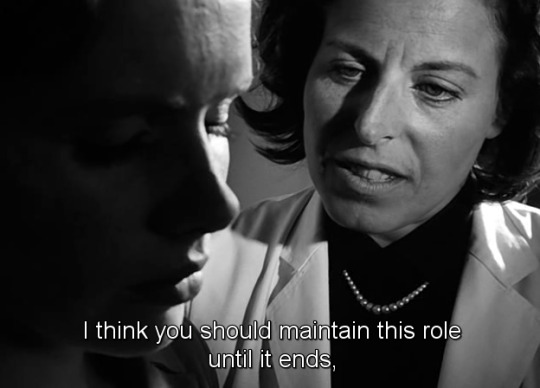
The Summer House
It's amazing how much Bergman packs in to the first 22 minutes!
Alma and Elisabet are now at the summer house alone together, enjoying themselves in this isolated spot near the sea. Alma grew up a farm girl, so is accustomed to this “rural seclusion”. Elisabet’s coldness and indifference has seemed to disappear, moving out of the sterile hospital room to this new setting. The two sit together outside and go through mushrooms they’ve picked, both with similar style hats (light and dark) as they subtly hum a tune in unison. Elisabet then compares her palms with Alma’s. Alma grins and says it’s bad luck to compare hands. The two are now on the rocky beach in their swimsuits. The beach is quite bleak, looks uncomfortable to lounge on and a bit other-worldly. Alma reads a passage aloud from a book she’s reading, meditating on the “anxiety of the earthly condition”, perhaps something she thinks Elisabet will find profound. Elisabet takes this in, is moved and agrees with the existential description. Alma however doesn’t agree, nor seems to fully comprehend what she’s read. In the house now. Alma has several moments where she begins to open up to Elisabet but then second-guesses herself, self-conscious of what the mute “artist” might think. And Elisabet IS hard to read. She seems to me bored and distant at times, then lovingly engaged and listening. Alma now smokes because Elisabet does and both dress similarly in black.
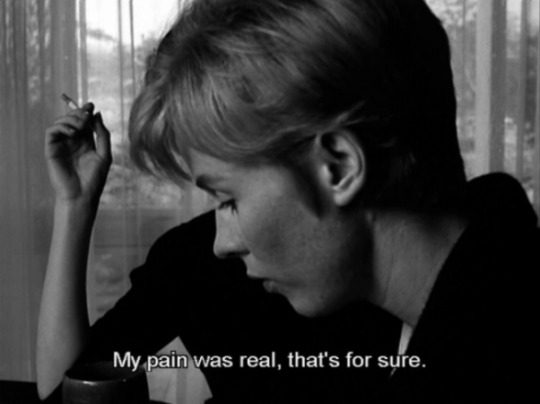
Alma continues to open up even more. A silent companion only leaves room for one talker. Who is the patient now? The camera angle features Alma’s speaking face in the foreground blocking Elisabet’s; one head blending together. It’s as if Alma is discovering things about herself for the first time...about her chosen profession as a nurse and a past relationship. The conversation moves to the bedroom. Both are in their night gowns. Alma tells a long, detailed story about an orgy on a beach involving her friend and two boys that approached them while they sunbathed nude. Elisabet is sitting up in the bed and Alma sits in a chair. Elisabet shows a few signs of pulling away due to Alma’s gregariousness and wears a cool “been there done that” expression, but as the story continues she becomes focused, still, and calculating. If I had to guess, this sexual experience of Alma’s is the most intense event of her life. She had cheated on the man she is now engaged to and is so vulnerable here in her confession. The acting by Bibi Andersson is superb. Alma ended up pregnant and had an abortion. She weeps with guilt. Is Alma’s mask fully off, revealing too much, bare to the bone? What does Elisabet really think about all this? Is she “gaining” from this somehow?
They move to the dining table again in the other room. It’s raining outside. Alma is loose and drunk, in a manner one is after a huge confession. She again announces her inferiority, saying how boring she must be to Elisabet and what use she could possibly be to her. She also says that she should be more like Elisabet and not talk. Alma then points out how they look alike and she could turn into her if she made the effort. Then she says, “You could turn yourself into me just like that. Although your soul would be much too big. It would stick out everywhere!” My favorite lines of the film. Alma then puts her head down on the table as if to sleep. Elisabet then speaks for the only time in the film, telling Alma to go to bed before she falls asleep at the table. Alma looks up blankly, puts her head back down, then pops up again and repeats what Elisabet just said. Was it just a thought or did Elisabet actually speak? Does Alma flirt here with Elisabet when saying good night? It looks like it.
Alma’s Awakening
The bedroom is foggy. Alma gets a glass of water then lies down in bed. Elisabet walks up the hallway into the bedroom, looking at Alma then into the white room around the corner. She then turns back. A horn from a boat blows ominously outside in the night sea. A slight breeze moves a white transparent curtain in the doorway. Alma raises as if summoned, goes to Elisabet and leans her head on her wearily. Then the iconic shot of the the two looking into the camera at us. Elisabet places her hand on Alma’s forehead moves it back over her hair as if this is allowing Alma to “see” now, an awakening...Elisabet being the guide. Is this an opening of the third eye? It may be a stretch, but it crossed my mind. The two actresses are so beautiful here, softly lit from above, and fold into each other afterwards like an integrated yin and yang as picture fades to black. The music reminds me of Hitchcock’s and I’m not sure I like it, but the moment is indeed powerful. Did Alma dream this? Does it matter?

Chaos
Picture fades back in and Elisabet greets us on the rocky beach. She enters frame from below, taking a picture of us with a stills camera. Alma is in the distant background next to the shore. Elisabet walks to her and takes a photo of Alma as she clumsily poses. Alma coldly asks Elisabet if she was in her room last night. Elisabet shakes her head no and shows no sign of lying.
Later in the house, Alma takes the mail to sent be sent off and has to take a drive to do this. In the car, she opens up Elisabet’s letter to the Doctor in curiosity. The first part of the letter is complimentary to the living situation and Alma, but then Elisabet writes, “it’s fun studying her (Alma) and how she cries over past sins.” The letter also mentions Alma’s orgy and the abortion and says how she “complains that her notions of life fail to accord with her actions”. Alma is stunned and gets out of the car. She stands stolidly dressed all in black next to a murky pond looking at her reflection in wide shot.
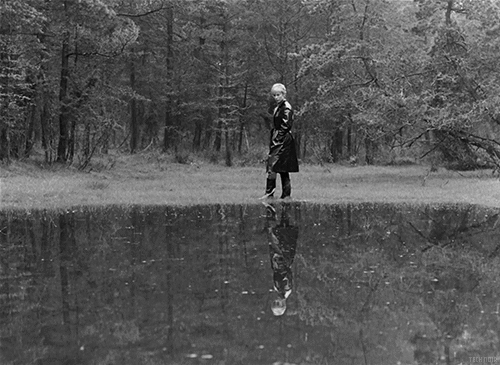
Alma is back at the house now in a black swimsuit with a grave look on her face. This expression was nowhere to be found until this point in the film. Outside she breaks a glass on accident and begins sweeping it up. She notices she missed a large piece, but leaves it after seeing Elisabet coming outside. The camera moves from the piece of glass as Elisabet’s bare feet pass by it, then back up to a watchful Alma. Again, camera fixed on the piece of glass as Elisabet narrowly misses it and tilts back up to a silent Alma. Eventually, Elisabet steps on it, making a painful sound in response. Alma watches from inside the house with a hard scowl behind a transparent curtain. Elisabet stares back with a concerned, furrowed brow as if she knows what Alma did. A violent sound effect comes in along with a literal splitting of the picture, a deep transition within the film and the character of Alma. She has crossed a line.
My first impression of the sound effect is it’s a film spool that is hung up in the machine...like the film has broken (similar to the glass) after Alma committed this act (or non-act). The shot then literally burns up, starting on Alma’s face to a quiet white screen. This effect would have seemed cheesy in almost in other film, but I think it works here. It is simple and clear and connects to the meta, self-reflexive nature of the film.
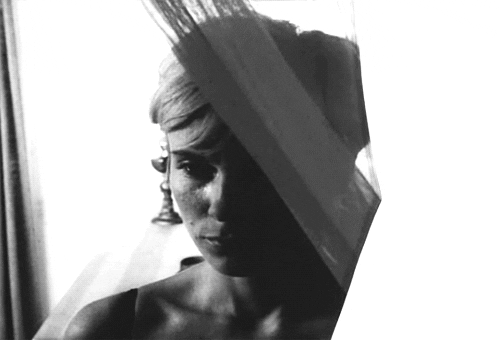
Everything has changed now. Alma's insecurities have caused her to become darkened. Her sought-after approval from Elisabet has been betrayed by the letter to the Doctor. She has lost herself and taken on a new protective persona. Or has she found power (even though misdirected) after her awakening? Pain leading to growth in her cycle? What is for sure now is she is very far from the sweet, unsure nurse we saw at the beginning of the film.
A voice in reverse is heard now (an effect David Lynch must have gleamed for Twin Peaks). We are again shown images similar to the opening of the film... the vampire, the skeleton, a spike going into Jesus’ hand accompanied by a disturbing scream and an extreme closeup on a shifty eyeball that the camera pushes in on... What do the eyes say and can the camera uncover it? Can we see the soul if the camera looks into the eye close enough? Camera fades in to Elisabet walking around the house, picture blurred and in slow motion, which eventually becomes focused and at normal speed. She exits the house and goes outside looking for Alma. Eventually she finds her and touches Alma’s cheek with sweet, subtle affection and sits down to read. Alma is dressed in all black with dark black sunglasses. She acts cool and distant and lurks around behind a sitting Elisabet, poking at her with words and becoming visibly more upset and restless by the moment. She soon loses the facade saying she feels used and discarded (like the Doctor explained Elisabet’s “acting role”). Alma continues saying she has been hurt very badly and laughed at behind her back. She then confesses she read the letter to the Doctor and accuses Elisabet of getting her to talk and mention things she’s never mentioned to anyone! Alma pleads for Elisabet to speak. The argument becomes violent. Elisabet slaps Alma and bloodies her nose. The two stop. Elisabet begins to laugh at the ridiculousness of the situation. I thought Alma might join in with the laughter here but she does the opposite and runs into the bathroom crying. She is so sensitive about being laughed at at this point that the internal turmoil just increases. After a while, Alma reenters the room calm and raw. She asks Elisabet if being truly genuine, telling the truth, not evading things, truly being oneself...sloppy and silly...can this be possible? She says Elisabet might get better if she just allows herself to be what she is. Elisabet smokes her cigarette, cooly facing the opposite direction and doesn’t react or show much at all. Alma is unsatisfied with the lack of reciprocity and says angrily she knows how rotten Elisabet really is. This strikes a nerve with Elisabet and she storms out. Alma immediately feels regret and asks God what she is doing, then runs after her.
A long, beautiful tracking shot along the rocky beach as Alma chases after Elisabet apologizing profusely. She says how honored she was for an actress of her caliber to be interested in what she had to say, but then how hurt she felt because she was betrayed in the letter. Alma “blabbers on”. Elisabet eventually turns as if she might embrace Alma, but coldly walks away. To me, it was as if the mask was projecting one thing, creating a pause in Alma, thinking that an embrace might occur, then Elisabet’s action doing another thing, walking away coldly. An example of the mask not connecting with the action. Alma falls to the rocky beach, distraught.


The next shot, in stark contrast, Alma is sitting serenely near the shore. Elisabet is in the house, pacing with a cigarette, looking out the window (that reminds me so much of a shot in Woody Allen’s “Interiors”). There is a deep anticipating heaviness that Bergman is masterfully able to create here with the help of the music. Elisabet shows more emotion here than usual. Is it because she is alone and no one is there to observe her? She shows visible sadness again soon after, alone in her bedroom. She then comes across a photo in a book. It is of Jewish children being lined up by the Nazis in World War II. Her sadness becomes deeper and focused, maximized by the horror-enducing music accompanying. Elisabet’s empathetic contemplation here is similar to when she was at the hospital watching the burning monk in the Vietnam War news footage. Closeup on the picture, which is of a young boy with his hands up as a gun is pointed at him. The camera then cuts to various other closeups, bouncing around the photo examining every face...every mask.
What is Bergman trying to tell us here? This may be a stretch, but my first thoughts were that Bergman is briefly pointing at something universal which includes all human psychological underpinnings. It is connected to our two protagonists in the film and what 's happening with them psychologically, but for moment looking beyond them, silently illuminating the potential evil (the shadow) within all human beings. That the fear of truly living without a mask can create such a sickness in man that one is potentially able to create this type of destruction towards others. That instead of facing oneself honestly, being whatever it is that you are, that a mental illness can form and the persona can fully take over. That one can become so identified with the persona of being a “Nazi” that they would point a gun at a “Jewish” child.
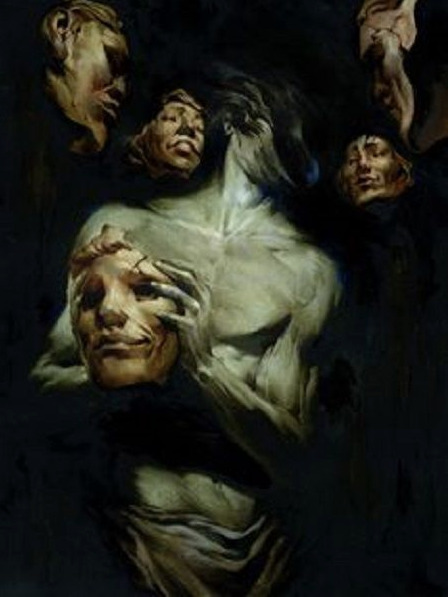

Again, back to the psychologist Carl Jung who looked to Eastern philosophy often as a reference for his work. In Eastern philosophy there is a common belief that under the mask is the godhead within each individual. To repeat from earlier, Jung believed the mask (or persona) was not the true self and could keep us from a much deeper, truer self which included a unified “collective unconscious” that all humans share. Opposed to a healthy mask essential for social life, if it completely overtakes the godhead (or the true self) chaos ensues within that individual because one is also identifying everyone else solely based on their masks. Divinity can no longer be seen in ones’ fellow man or woman. All humanity towards others can potentially be thrown out the window because of this difference in “mask” and atrocities can occur because of the dual nature of this thinking, rather than a unifying recognition of a collective unconscious in the “other”. And if there are enough individuals, disconnected from the godhead/true self, you get Nazis killing Jews. ALL mask. ALL persona. And no recognition of the holy selfhood in others, which ultimately stems from fear, blinding the individual... And taking us back to the film of our two fearful protagonists where the persona is being focused upon.
Does Elisabet understand all of this yet is unable to change herself? Or is her silence a rejection of the mask, a rebellion to conform and/or an attempt to get better? I don’t know.
We cut to Alma now in her bedroom and she is having a bad dream, shaking her head violently side to side. She wakes up and turns on a portable radio. Through the static it says “we don’t talk...listen...or understand”, then the voice says something about “Elisabet” and “by what means should...to enable.” Is the radio representative of her conscious mind tuning in to another frequency? I see no other reason for the radio that randomly appears out of the blue. We then see Alma going into Elisabet’s room, who is asleep. Alma begins watching her, smelling her, taking her in and even touches her face. She comments aloud how Elisabet’s face is slack and her mouth is swollen and ugly, then points out a wrinkle. She also mentions she can see a scar that Elisabet normally covers with makeup. Alma seems to relish in the fact she sees her this way, with her guard down and is able to feel superior in this moment. Alma hears a voice from another room that says “Elisabet” and leaves. Is it the radio from a few moments before? Elisabet then opens her eyes and looks into the camera again at us. She was not asleep. She was acting like she was sleeping. Even when Alma thought she was superior, Elisabet was still conscious. Perhaps because the unconscious never sleeps and Elisabet is representative of the unconscious.
"Elisabet” and Mr. Vogler
This next part becomes the most surreal and hardest to understand in my opinion. It is dawn now. Alma walks through the house, then is startled by Mr. Vogler, Elisabet’s husband. He calls Alma “Elisabet” and begins explaining how this has been hard on their little boy and continues further about their relationship. Alma once again says she is not his wife, as Elisabet creeps up from behind fixated on Mr. Vogler, lurking behind Alma’s shoulder in a two-shot closeup. Elisabet then guides Alma’s hand up to caress Mr.Vogler’s face, like Alma is her puppet. He is a strange, stern looking man with dark sunglasses. Alma now is under the spell that this is her husband, and says she loves him very much. We’re now watching in a reverse shot with Elisabet in the foreground, looking upset, as the other two are professing their love for one another. Alma moves her gaze to Elisabet in a conniving way and continues with Mr. Vogler in spite of Elisabet and they kiss. This is one of the most puzzling parts of the film to me and I found myself, mentally, wanting to check out. I had to consciously will myself to pay close attention and try to decode this. I think because it smashed the narrative I currently had going in my head of what I thought the film was. It’s as if Alma is now a vessel controlled by Elisabet, but why? Alma seems to be unaware of Elisabet, then aware. Is it because Alma, who adores Elisabet, can now see what it's like to be in her shoes? Is Elisabet upset because Alma is now privy to this? I think there is also a deeper subtext throughout the film where Alma is representative of the “conscious” and Elisabet the “unconscious”, which is running parallel to what is literally being shown, yet sometimes they blend like a dream. I’ve mentioned this once and is worth mentioning again. Alma/Elisabet and Mr. Vogler are laying down now and it seems they have just made love. Alma/Elisabet soon goes from tender to a violent struggle asking to be anesthetized! She cries saying she is cold and rotten and indifferent, “all lies and imitation”. The camera moves to an extreme closeup on Elisabet and fades to white. Does Alma clearly see Elisabet now? Was Alma able to break through Elisabet’s persona and truly feel what it was like for her with her husband and why they are estranged? Or it could very well be Elisabet detaching herself from the past experience and processing it this way as we see things from her point of view. And rather than Bergman showing a flashback with Elisabet and Mr. Vogler, he presents it this way with Alma standing in? I keep asking these questions because I feel the questions are more important than the answers. A film that just gives answers is not a film I am interested in seeing. If answers are the most important thing then one should just read the dictionary and not watch Persona.
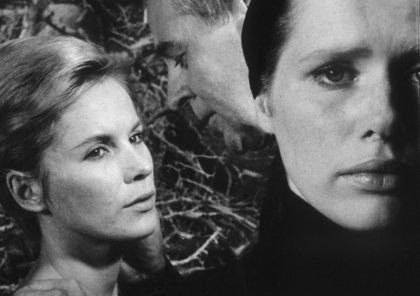
Alma Strengthened?
It is daylight now. Mr. Vogler is nowhere to be found. The scene starts as almost a complete nosequitar to what just occured. Alma sees Elisabet hiding something under her hand and makes her show what it is, like a student being disciplined by a teacher. It is a picture of Elisabet’s child. Alma asks her to talk about it. Elisabet shakes her head no, so Alma speaks for her. Alma’s attitude is similar to the Doctor’s now and is dressed exactly like Elisabet. Both have been in black most of the time, but now it is exactly matching, up to the detail of the black headband. So why is it important they dress in black? There must a reason, or several. I’ve seen some far out interpretations of what this film is, so I’m going to take a swing regarding a possible reason why this deep black is worn by the characters a majority of the time. Both are in a state of “dying”. Not in the physical sense, but psychologically...a chaos, a putrefaction (alchemy term). It doesn’t necessarily mean something so simple as “black is negative”/“white is positive”, but chaos/putrefaction/psychological death is an essential stage in life as fragmented reality occurs. It is impossible to stay in the light all the time. We are human. We are foulable beings tossed out of the Garden of Eden. We become confused, tragedy occurs, we become fearful. This is what life is and it’s inevitable. In this film’s case, unity does not reign but a duality of “Alma” and “Elisabet”, who must pass through this stage in the cycle in order to become unified and “in the light” again (atleast that’s the goal). The film is at a point in their lives in which chaos reigns, for reasons I’ve previously highlighted regarding the shadow, persona and self. And Carl Jung was very well-versed in Alchemy and it’s metaphors, as I assume Bergman was as well. Also, perhaps this connects to the morgue and skeleton during the beginning sequence
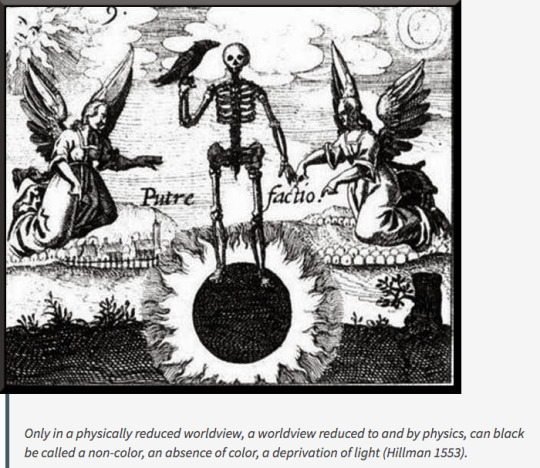
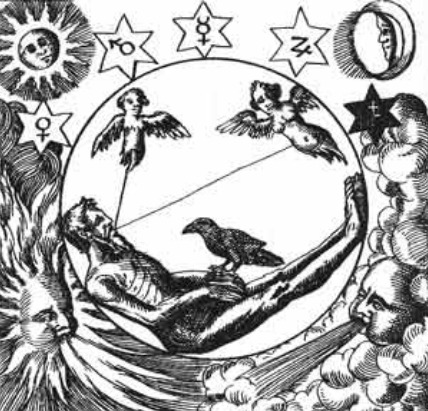
This is the most still and confident we have seen Alma in the film. Alma now begins to speak Elisabet’s story to Elisabet. This begins with a comment someone made to Elisabet at a party telling her that she had everything as a woman and an artist but lacked motherliness. Elisabet, in turn, then became pregnant. Elisabet next felt frightened, in over her head regarding all that pregnancy and motherhood required of her, but she “played the role”, put on the persona as a Mother. As Alma speaks, this is the most emotion Elisabet has shown in front of Alma the entire film, looking away, furrowing her brow, half-lit, terrified and found out! Alma continues, saying Elisabet had wished the baby would’ve been stillborn and a deep shame washes over Elisabet as she ducks her head. Alma is vicious, continuing on about how much Elisabet despised the baby, how it cried day and night and how she was scared with a bad conscience. The boy eventually went to live with relatives and Elisabet went back to the theatre. The boy loves his mother greatly, but Elisabet is always cold and indifferent...disgusted by him. The scene then starts over again, but with an over-the-shoulder shot onto Alma this time. The exact same dialogue is repeated and we have to again hear this painful dressing down of Elisabet and her resentful relationship with her son. The over-the-shoulder shot turns into two 1-shots, the same as with Elisabet the first time. Alma is also half-lit and I don’t think she ever blinks (which made me think of Paul Thomas Anderson’s film The Master scene at the table but between two men.)
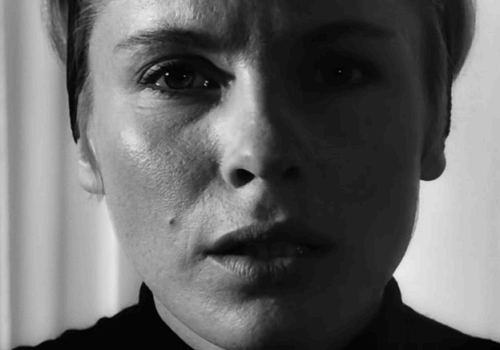

After Alma finishes (on a straight-ahead closeup) Elisabet’s face begin to take up the darkly lit half of Alma’s and she says, “No! I’m not like you”, “I’m Sister Alma, I’m just here to help you.” The two faces are now one. Duality to Unity. Both face-halfs are now in the light. Elisabet’s half appears and disappears a few times and then appears fully with punctuating music at the end of the scene, freeze-framing before fading to gray. It is striking how well their faces actually match up.
Obviously I’m going to expand on what I think happened here. Alma has entered Elisabet’s head so deeply, she was able to intuit this dark story about Elisabet and all of the unflattering details. Alma had to suffer to get to this point in order to enter Elisabet’s mind. And her entry is so intense she begins to lose herself. Her self-assuredness then quickly turns back to the vulnerable, scared Alma from before. Is this for the best Elisabet hears this? I kept thinking while watching that a regular moviegoer would interpret this as overly harsh by Alma. But it is also Elisabet becoming fully aware of why she decided to become pregnant in the first place and the subsequent emotional damage caused to her son. It then covers up to the point where she becomes mute during the Electra play. Elisabet needed Alma in order to get to this point of realization, as painful as it might’ve been.
A Standoff and Enigmatic Ending
We open on a 1-shot of Elisabet and a quick close-up catching a glimmer of defiance as Alma enters the room with her nurse’s outfit on now. Alma attempts to match her defiance and a stareoff ensues. Alma says she’s learned quite a bit and physically punches forward directly in front of an unflinching Elisabet. Alma then leans in and says she will never be like Elisabet (denying the shadow) and says she changes all the time and Elisabet will never get to her.
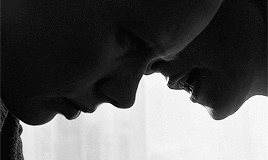
Another stareoff. Soon Alma breaks and begins nervously hitting the table.
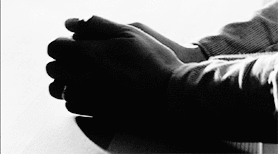
I have thought about this scene moreso than any other scene after watching the film. To me, there is so much to unpack. Alma is never able to get a leg up on Elisabet for very long. Again, I think this reinforces the metaphor that the conscious is unable to escape the unconscious. The same as a human being unable to escape the eye of God. This is why pre-determination was mentioned at the beginning of this post. If we are following this logic, Alma is predetermined not to gain a mental edge on Elisabet. She’s not formed to have the depth that someone like Elisabet has, no matter how much she’s “learned” or the mask she has tried to maintain. Elisabet knows her thoughts and has the mental ability to consume her and Alma knows this and it manifests in this anxious pounding on the table. Alma somewhat regains composure in her face but her words are gibberish nonsequitars...almost poetic but too garbled. Elisabet turns around and is in the foreground of a closeup 2-shot and mouths her words as if she is controlling what’s coming out of Alma’s mouth. Her mouth does not sync with the words but it does convey that Elisabet is in control. Alma continues to struggle, trying with all her might to articulate what she wants to say. But the gibberish continues, as if two minds are battling one another and Elisabet is winning, silent and calm, while Alma strains to squeeze out meaning verbally with little luck. Then, something revealing occurs... Elisabet runs her nails down the inside of Alma’s forearm until drawing blood, then goes down and begins sucking the blood like a vampire. Eventually Alma fights her off and begins slapping her repeatedly until it cuts to black. I did accidentally stumble across an article by BFI (British Film Institute) that states Bergman intentionally took Elisabet’s surname (Vogler) from a film called “The Magician” involving a character who was an artist that sapped the energies of others for his artistic gain. This makes sense because, as mentioned, Elisabet has used her mental energy to consume Alma by essentially playing the role as the mute patient. I don’t think this was an elaborate plan on Elisabet’s part, but kind of fell in her lap and she went with it. Also, due to the meta-nature of the film (inside the film projector, characters looking into the lens, etc) is Bergman also implicating himself? This film is very aware of itself and makes this clear several times. If I had to guess, Bergman is also saying he is not innocent, that he is using these characters/actors to play out his dream in order to gain a better of understanding of his own psyche. Also, are we, the audience, implicated as well? Elisabet looks at us, takes our picture, is aware of us...aren’t we placing ourselves inside these characters? We see their vulnerabilities, analyze their weaknesses, pass judgement...we use them in order to come to some type of new understanding within ourselves or for our own entertainment. Is the nature of art itself vampiric? In a sense, are Elisabet, Bergman, us and all artists vampiric in a way? Absolutely.

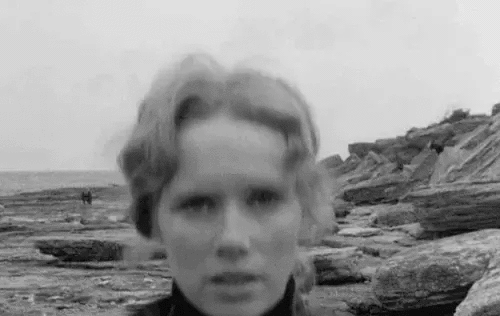
Then, right when you think you have all it figured out, there is another couple of scenes that make you think otherwise. You have to take one scene at a time with Persona. It is less of a narrative and more of a dreamlike poem. Alma nows enters the hospital room and Elisabet is in bed in a sedated state. Alma lifts her up slightly and says, “Nothing, That’s how it should be”, in a comforting manner and then lays Elisabet’s head back down. It then fades into a repeat of the Alma/Elisabet dream shot of them looking into the camera from earlier in the film, perhaps comforting us the audience, slowly waking us up after this traumatic, confusing ride we’ve been on as the film winds down... telling us it’s nothing, it’s okay, it’s how it should be. In turn, Alma wakes up in her bedroom in the Summer house. We are not in the hospital anymore. She peaks out and sees Elisabet packing her suitcase. Alma then begins putting all the summer outdoor chairs inside the house to pack up before she leaves. We do not see Elisabet again. What happened to her? Did she just leave without saying goodbye? Alma looks into the mirror and brushes her hair back as was done in the scene with Elisabet from earlier. A translucent image of Elisabet then appears behind her as seen below. She then smiles to herself and puts on her hat.
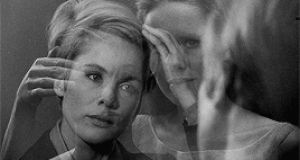
As she exits outside with her suitcase, there is a large concrete sculpture of a face that the camera moves to. It then flashes to a shot of Elisabet on stage as Electra. Alma walks to the bus. It then cuts to a camera sweeping down from above on a film set to capture Elisabet in frame. It cuts back to Alma getting on the bus to leave and the camera pans to dark rocks on the side of the road, then fades into the boy in front of the screen from the beginning of the film, reaching out to touch the screen. The screen includes a blurry image of what looks to be Alma that soon fades completely to white...a screen within a screen. As we, the viewers, reach out with our minds to comprehend exactly what the ending means, the shirtless boy with the glasses also reaches out to feel an image that disappears. The film roll runs out (literally on screen), falling off the spool and the projector burns out. The End.
To conclude, I just realized that attempting to analyze this film is almost like chasing a conspiracy theory, looking for connections that may or may not exist. I know that I missed some things. I know that I got some things wrong, but the joy of thinking about these films is that's okay. :)
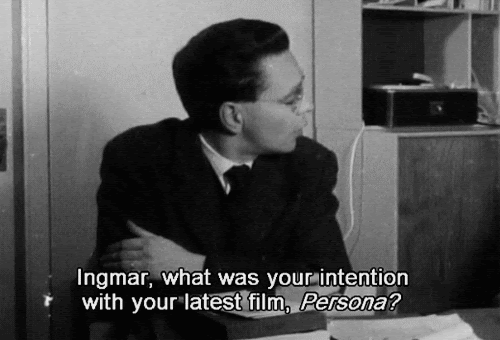
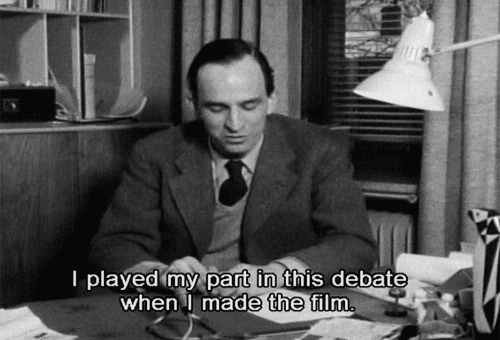

Also, in closing, I wanted to add an image that I had an immediate reaction to while looking for behind-the-scenes photos. As you can see, it is of Bergman, Liv Ullman and Bibbi Andersson. And as you know by now, this a very heavy, dark film on identity and internal chaos. But there is such love and sensitivity and thoughtfulness in this photo of three artists in the middle of making something extraordinary and revolutionary in cinema. It brings up some deep emotions in me because this is something I yearn for, almost like the boy touching the screen. I do truly feel I've had small glimpses of this type of satisfaction while working on my own projects, sparking a recognition, knowing it is rare and beautiful and transcendent, providing more to aspire to.
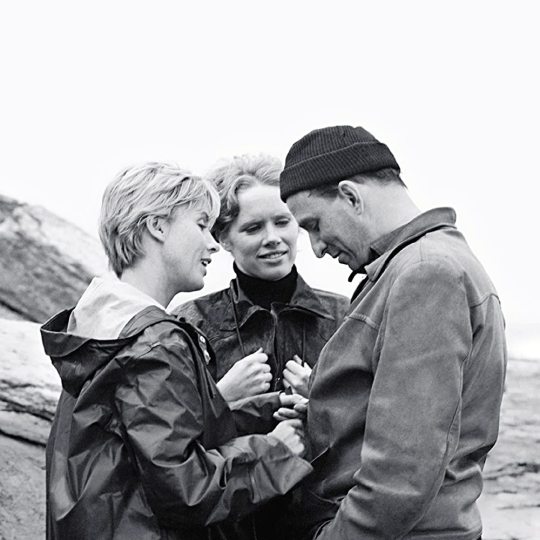
#cinema#persona#bergman#livullmann#bibiandersson#ingmarbergman#swedishfilm#filmanalysis#1966#criterion collection
6 notes
·
View notes
Text
The AU only I’ll appreciate...(Part 1)
Elizabeth adopting the Seed brothers and raising them as her own would include:
Moving to Paris, France
The Seeds are now French/(Americans)
They have dual citizenship in France and America
Moving back to Rome, Georgia (For Summers)
Exotic vacations
Homecooked meals every day, a mother’s love, a healthy family demographic, and catering to the Seed Brother’s whims. (because they’re precious an innocent rolls!!!!)
A hormonal teenage Jacob has pictures of Elizabeth instead of Nudy Magazines
Jacob developing a crush on Liz
Jacob refusing to call Elizabeth Mommy, Mamma, Mom, Mother, or Ma. While John and Joseph call her Mommy and Mamma.
Joseph and John are Liz’s precious cinnamon rolls/they’re her Little Princes
The boys grow up learning how to be gentlemen
Jacob turning 18 and confessing his feelings to Elizabeth
Jacob has developed a full-on Oedipal complex
Jacob joins the American Army at 21 and lost virginity to Elizabeth a year before going to basic training
Joseph doesn’t know what transpired between Jacob & Elizabeth before he moved back to Rome, Georgia to start a small cupcake business; that’s how he met his wife.
John attends Columbia University to pursue a career in Law
Jacob comes home from war and is now homeless//too mentally unstable to go back home to the woman he loves and his brothers.
Joseph loses his wife in a car accident and the only reason he stopped himself from killing his infant daughter was John and Elizabeth’s support and love.
Joseph moving back to Paris, France with his infant daughter and living at his mother’s large multiroom apartment (with a view)/His Childhood Home
Jacob being found by Elizabeth at some point in Rome, Georgia.
She tries to piece him back together herself after the demons he brought home from the war consumed him.
His feelings for her come back full force the second he tastes her cooking. (like in Ratatouille, that scene with Ego) The light is brought back to his eyes.
Reminds himself he’s a grown man, 40 years of age and Elizabeth hasn’t aged past 24, so really he feels like this could work.
He tries to charm and romance her the best he can, even in his broken state, with the knowledge she equipped him with as a younger man. Says things like “I haven’t felt the touch of a woman in many moons.” which always gets her blushing and laughing. (And a little horny)
Elizabeth inevitably gives in to her own desires and falls in love with him. They’re married by the time they move back to France.
Joseph traumatized by his older brother marrying the person who is essentially their mother.
Lots of drama
Jacob Seed wearing a gold wedding band//He’d scrounged up the money to buy Elizabeth a small wedding ring back in Georgia. She says it’s the best piece of jewelry she’s ever owned and NEVER takes it off.
Joseph trying to dictate the whole situation like the only rational sain person in the house, all while Jacob has a beer in the kitchen and watches in silence as Joseph rambles on about incest and Lust.
John comes home//He came back to Paris as a Defense Attorney hired by an American man on trial in France. It’s a very high profile case.
John can’t process the whole Jacob x Elizabeth, he’s like an old mac computer (John Exe. has stopped working)
he’s fully convinced Jacob has a Mommy Kink but in reality, it’s Elizabeth who has a Daddy Kink.
Jacob is just happy to claim the woman he's coveted throughout his (young) adult life.
Jacob works at St. Peter’s Paw Pals; An animal rehabilitation hospital that caters to dogs trained for war.
He adopts an emotional support dog named Mephistopheles
Mephistopheles and Jacob both support each other emotionally; plus, when Elizabeth conceives, he trusts his buddy to act as a guard dog. To protect their newborn.
John is still a THOT. He wears a speedo to the beach, blends in nicely in Europe, he loves European women. (And Nude Beaches)
Things are weird between Joseph and Jacob for a while
Doesn’t help that Joseph’s baby’s new favorite word is “YES” (Guess who kept saying “Yes! Yes! Yes!” over her crib?)
John learned the power of “YES” from a Shaolin monk who told him to be open to new experiences. That’s why John is the only brother who continues to travel seasonally! (very well traveled/he looks for new things to say yes to.)
Jacob and Joseph finally sit down over beer and brotherly bonding to talk things out.
Joseph reveals he’d known about Jacob’s feeling for a while as he caught him and Liz together one night. Which makes Jacob turn red. The more Joseph gives details the more embarrassed Jacob becomes. It’s to the point where Jacob if coughing into his hand, he can only look Joseph in the eyes when he’s done talking.
Jacob doesn’t like to think his brother knew him at a time where he was a young inexperienced man, he’d been trying to start a relationship with her back then.
Jacob had a tendency to act a lot like a Husband and Father, even back then. So he made no effort to hid his feelings for Liz and he should have been more...”quiet” at night.
Jacob just feels like a Dad who found out his son walked in on him while he was screwing around with his mother (He should have locked the door)
Joseph begins to understand Jacob’s point of view and realizes Jacob never saw Elizabeth as: “Mommy” she was always “Elizabeth” to him...or “The Angel who saved us from separation.”
John comes home five minutes later and invites himself into the conversation.
John: “The last thing I ever wanna thinking about is my brother fucking my mother...” is genuinely perturbed.
Jacob: “I’ve always been the glue that’s held this family together. I’ve been our Dad even before the day Joseph made me that Father’s Day card (When Joseph was in elementary school)..I didn’t choose to fall in love with Elizabeth. Just happened...like when I took her virginity.” Clarifies Liz was also a virgin and lost her virginity to him.
“AAAAAAAAH STOP! I DON’T WANNA HEAR! I don’t want to hear this!.....YEAH! sure! sure! You just fell into her vagina!!!”
John is out on the balcony, drunk, screaming about “How could she do this to me?!” Starts throwing a tantrum like a child. Grabs empty beer bottles and throw them off the balcony. Would have thrown furniture too but Jacob restrained him.
John’s tirade fully redirected itself to Jacob, as he weaseled out of his grasp like a greased monkey. “How could she find you attractive!?“
John was lucky Jacob was his brother or else he would have been on the floor in the fetal position with a broken nose.
“You’re a burnt lasagna looking wilderness scout! How could she find your Ginger Ale looking ass more attractive than me? I don’t smell like an outhouse or look like a hobo!” (This was borrowed from @glorygodngore from the post https://glorygodngore.tumblr.com/post/182764270439/you-know-what-one-of-my-favorite-fc5-hcs-is-john )
John just doesn’t like any conceivable idea that Elizabeth would rather be with a wartorn soldier like Jacob than with an eligible bachelor with a disposable income...someone like him.
He might not have as much money as John but Jacob’s testosterone is pretty much the equivalent of Jeff Bezos’ disposable income.
“Women at their peak fertility prefer the smell of men oozing with testosterone. Does that give you some kind of clue as to why Elizabeth’s with me?” He’s implying that some women want a real man.
John starts yelling vulgarities, he eventually gets dizzy/lightheaded and passes out.
The last thing John said before he passed out “You’re not my Dad!”
#Jacob Seed#John Seed#Joseph Seed#AU#Far Cry 5 AU#AU where there's no cult and it's somewhat normal life#elizabeth dewitt#Jacob x Elizabeth
22 notes
·
View notes
Text
“A Couple” Favorite Podfics (I just love a lot of things okay?)
(I might make a part 2 of this list after I’ve listened to the millions of podfics in my dropbox)
[podfic] Last City by AshiiPods (ashiiblack) - 2 hrs 32 mins
Twenty-four Twenty-three men, six cities, and one unusual sexual requirement.
Adrift [podfic] by semperfiona - 1 hr 29 mins
Auror Harry takes a vacation in the Caribbean and ends up falling from the sky, straight into the lap of Draco Malfoy, modern pirate.
Sex on Legs in Six-Inch Heels [podfic] by semperfiona - 1 hr 3 mins
Draco Malfoy is a brilliant freelance cursebreaker and the only one who can help the Department of Magical Law Enforcement with a very dangerous case, but more importantly, he's wearing six-inch heels, and Harry cannot handle it, he really just can't.
[Podfic] The Purpose of Rubber Ducks by teas_me - 1 hr 44 mins
Harry likes his job in the Office for the Regulamentation and Control of Interweb Publications well enough, but Malfoy's being a git and making trouble as usual. Luckily Harry can go home and chat with his new friend, the anonymous comedy blogger who's so popular with wizards and Muggles alike... Features Muggles, inter-office memos, house-elves, rubber ducks, 4am chats, and porn. Because that's what the internet is for.
[Podfic] Harry Potter and the Incredibly Organized Personal Assistant by Hananobira - 21 mins
Harry Potter's new assistant is snarkily organized.
[Fic + Podfic] Onslaught by Queenie_Mab, zeitgeistic (faire_weather) - 58 mins
Since Harry developed the unfortunate ability to smell magic, his life has been a series of scent-induced headaches…until the night he finds a mysterious wizard in a sun-scented Glamour.
Then Comes a Mist and a Weeping Rain [podfic] by semperfiona - 2 hrs 10 mins
It always rains for Draco Malfoy. Metaphorically. And literally. Ever since he had accidentally Conjured a cloud. A cloud that's ever so cross.
What we pretend we can't see (audiobook) by FayJay for gyzym - 12 hrs 50 mins {It’s a long boi}
Set 7 years after the Battle of Hogwarts:
Auror Potter is summoned to a break-in at a rather eccentric little museum in the house he used to own.
[podfic] Erosmancy by Lazulus - 1 hr 3 mins
Blaise was immune to whatever it was people usually felt around his mother, for which he was profoundly grateful, since no one needed an Oedipal complex on quite that spectacular a scale, but that didn’t mean he didn’t have a thorough respect for her gift.
[Podfic] Stately Homes of Wiltshire by Lazulus - 5 hrs 55 mins
Malfoy Manor has mould, dry rot and an infestation of unusually historical poltergeists. Harry Potter is on the case.
[podfic] Slithering by Lazulus - 2 hrs 31 mins
Draco found the nest down in the Manor’s cellars, while he was clearing them out.
[podfic] Reparatio by Lazulus - 1 hr 34 mins
Draco snorted. “I’m not reduced to penury. I want something considerably beyond money, and I rather think you’re the only one can give it to me.”
“You want the Invisibility Cloak,” Harry said, flatly. He’d half expected as much; it was the only thing he had that Draco could want—
“Don’t be stupid, Potter,” Draco said. “I want my reputation back.”
[Podfic] Coffee by Writcraft by fire_juggler - 43 mins
Sometimes it’s just a story about two wizards and a muggle coffee shop.
[podfic] Come For Me by Frayach, Queenie_Mab - 3 hrs 3 mins
After Draco is paralyzed in an accident, he and Harry discover a new way to make love. Please read Author's Notes!!
Bonus Deamus podfic:
Hiding Scrawl, Licking Freckles, and Other Average Wizard Things (Podfic) by GirlWithaPearlEarring - 20 mins
Someone out there is obsessed with his freckles, and damn it, Seamus Finnigan wants to know who.
Uselessly fluffy Soulmate AU where the thoughts of your soulmate inscribe themselves on your skin in a shifting magic tattoo.
Thank you @podcastnineandthreequarters , @inatelydepraved , @godblessdrarry , @geminio-drarry . @wingirl2015 for commenting on the previous post that you’d like to see this!
296 notes
·
View notes
Text
Swan Lake - no longer a fairy tale
Right, so... Nobody asked me to, but something so marginal cannot stop me, clearly, so I went and translated the longest, the trickiest, the most profound review I have ever written. (And that includes POB Giselle, Swan Lake and Onegin! OK. Maybe not Onegin. But since I’ve done this one I can almost make myself believe I could give translating Onegin a go as well.) (She said and then promptly kill herself before she could made another clearly, completely and utterly deranged decision.)
Half of the things don’t make sense, I’m sure. And I can only hope they made sense in the original. (Which they probably didn’t, let’s be real, but since when this matters to me anyway?) (God, I literally cannot stop babbling, somebody strangle me or something. Or at least take the keyboard from my grabby and apparently very high fingers, that decided to simply vomit words after words for no real reason and with no brain to mouth/fingers filter whatsoever!)
It’s in times like this I truly wish to be able to write in an actual English language. Or for my mother language to be a world language, not some beautiful, hot mess, but a mess nonetheless, from the middle of nowhere. A mess I despite of everything love dearly and even live in this illusion of me being really pretty good in using (or more like playing with) it.
What is also clear - I, for a reason not known to humans, love to write absurdly, ridiculously long sentences. Be it just up to me, I’d write a whole review in one obscure linguistic construction I call a perfectly normal sentence. I was told however, that English doesn’t really do or like such things, so I tried to shorten them. Or some of them. Was really unbelievably succesfull doing so...
No reason to prolong this now, I guess?
So just, please be patient. Or benevolent. Or try to laugh in private at least! Look, I tried and I know it’s actually rather pathetic to be so spectacularly bad in English grammar, that I supposedly learnt from the age of 5 (but then spent more than 15 years actively hating the whole language, which... doesn’t make sense, I admit, but maybe explain some things), but... I mean, it would be better than google translate, if anything else. It HAS TO be!
As always - I appologize for anything and everything I did to the poor English language. It doesn’t deserve such a poor treatment.
Were there anybody who would feel personally attacked by my sheer ignorance of the basics of language of Shakespeare, Byron or Shelley and would want to make this thing better, let me know! (Even though I am afraid there are so many mistakes, your eyes will be bleeding around the end of 2nd paragraph...)
Last one - I have no idea how in/definite articles work!
(Good thing I don’t write fiction of any sort, ANs would be longer than the actual thing.)
Swan Lake, no longer a fairy tale
Whenever the two words – Swan Lake – were mentioned, everybody had some universally shared idea of the final picture. Nothing has drastically changed with John Neumeier (1976, Illusionen – wie Schwanensee), who mixed the original fairy story with events from prince Ludwig II of Bavaria’s life, nor with Mats Ek (1987), whose prince was torn between imaginary princess Odette and real life Odile, nor with Jean-Christophe Maillot (2011, Le Lac) and new relations between his main characters, not even with Alexander Ekman (2014, A Swan Lake), who came back in time and took a look at the first premiere of said ballet in 1877 and tried to make a rather poetic story about what from certain point was started to be called a fiasco. As if the later Petipa/Ivanov version needs any more boost…
The unshakable certitude was irretrievably broken in 1995 by Matthew Bourne. His Swan Lake was new, daring, bold, with unexpected twists and one could not left theatre feeling indifferent after seeing it. Part of the ballet world turned its back to such profanity of beloved classic. The other part fell for its captivating charm, and since in 2018 Bourne’s Swan Lake came back to his New Adventure’s repertoire for umpteenth time, after hundreds of successful shows, many tours across the globe, adorned with every possible theatre and dance awards, it seems clear who were right then, 24 years ago.
The most common characteristic of Bourne’s Swan Lake is „the male one“. Prince is in the centre of attention, black swan Odile is changed into unknown Stranger, and most obviously – all the swans became purely men’s business. Which opens completely new perspective for male dancers and saying that this ballet has a major influence to whole generations of artists is hardly an overstatement.
Bourne follows the original structure and basic frame of Swan Lake. There are still four acts, act one follows the Prince, his character, the environment he’s living in, relations he has, act two is for the swans, act three still represents the ball, and in act four, where traditionally the Prince is coming back to the lake, here the swans appear in prince’s room. Many times even the formal structure is intact – the prince’s solo at the end of act one, pas de quatre of both little and big swans, or Bourne’s take on character dances in act three. Even the entrée of swans in second act follows the same space structure of the Ivanov’s original /aka swans are coming one after the other and crossing the stage from left to right (dancers‘ perspective)/.
Oedipal Complex, repressed sexuality, low self-esteem
Bourne’s Prince, his personality, is more than ever influenced by his upbringing, by the estrangement of aristocratic background, his world constantly controlled, constricted by rules and rituals, with no spaces for affection, understanding, empathy, every emotion being replaced by duty. Bond between son and mother the Queen (ice cold, distant Katrina Lyndon for whom one cannot feel an ounce of sympathy, or more emotional, but still dismissive Nicole Cabera) is minute, almost non-existent, which has such a strong impact on the introverted, socially inept, insecure Prince, who is on top of all that haunted by strange dreams about swans. The feeling of lacking something gets even worse when he clearly sees his mother is more than capable of showing emotions, particularly towards another young men.
During yet another military parade or boat christening or exhibition opening, the heir to the throne is met with a bit silly, ill-mannered and completely unsuitable girl for his royal life (incomparable Carrie Willis, whose interpretation makes her character pretty sweet with candid, open-hearted warmth), who shortly after became his girlfriend and went with the family to the opera house to watch a ballet performance. Staging theatre scenes within the actual production /we call it theatre on theatre, which probably doesn’t make sense in any other language then ours, sorry/ is always very rewarding. Bourne is on top of that master of choreographic punchline and this scene (to pas de trois from Act I music) combines all clichés from romantic sylphs, awaken Floras, forest beasts to well-built male heroes one could think of and is a joy to watch for its grotesqueness as well as for the subtle details in gestures, ballet quirky manner or choreographic pattern for those, who know where to look for them.
The prince is trying to find his freedom in a night club, but to no avail. He’s met there unexpectedly with his frolicking girlfriend, then he got himself into a fight with one of her suitors (or maybe rather clients) and at the end his soul is beaten for good, when he has to watch the royal secretary paying some money to the one girl, whose affections he believed were genuine. (And it kind of doesn’t matter they most probably truly were.)
The only logical solution for the prince is a suicide. But before he’s able to throw himself into waters of a small park lake, majestic Swan appears and everything is changed at once. Traditional swans‘ corps de ballet danced by women is often associated with delicate elegance, crystalline beauty, dreamy atmosphere and aesthetics of homogeneously moving bodies. Swan is becoming a pure ideal almost as if from ancient Greece. Bourne’s swans are first and foremost animals, he’s not denying their grace, but is showing their slight awkwardness and ridiculousness in some movements at the same time. His swans are wild, independent, fetterless. Looking sinister when lining up to attack the prince, their physical, natural power strengthened by additional slapping arms, stamping feet, hissing and dangerously sharp, audible breathing. The Swan alone is very wary of the prince, uncompromisingly harsh, defensive, with sharp edges of aggressiveness that serves as self-defence of this imposing, powerful creature from anybody who would think of causing any harm. The almost imperceptible gestures calling the prince towards him are even more meaningful then, the moment when he nuzzles prince’s chest indescribably intimate.
Next evening there’s a ball at the palace. And even though it may seem the main reason of it is prince’s engagement thanks to all the ladies present, it’s the queen in her bright crimson dress amongst all black gowns who is in the spotlight. While her son doesn’t even know, what he should be doing with all said ladies. Break from routine comes with mysterious Stranger, whose raw, animalistic charisma draws every female’s attention to him, which he welcomes with great satisfaction. At the same time it also affects, quite unintentionally, the utterly unprepared prince, because Stranger’s arrogant dominance has something from Swan’s animalistic fierce. /Dear English language, you have many words. More than my mother language. But you have exactly nothing that would or could match prchlivost. Or at least I am unable to find it./ As Odile in original libretto, the Stranger dances his way through character dances (the Neapolitan one stands out with its light-hearted fun it makes of cliché Italian relationships) and finds his dancing peak in duet with the queen (music of so called Black Swan Pas de Deux). It is when prince’s psyche breaks and he, in his imagination, is thrown in arms of unknown to be faced with intimacy, sensuality, sexual tension and even the most basic physical contact, everything so strong even person of sound mind would probably find it difficult to cope. Therefore, when the Stranger kisses the queen, prince is there with gun in his hands and complete madness in his eyes. In chaotic situation gunshot is heard (although not by prince’s pistol), prince’s girlfriend falls dead and terrified young man is drawn away.
The tragedy is inevitable. To padded cell, where the prince is held, come doctor with the queen followed by group of nurses with queen’s face, whose hairstyle and white uniform may resemble the demonic nurse Ratched from the Miloš Forman’s film Flew over the cuckoo’s nest. After certain medical procedure (just shy from lobotomy) the prince is taken to his room, where the miserable, wounded Swan emerges from his bed. Shortly after he is followed by irritated flock of other swans, that throw themselves unbridled on the young man and then even on their supposed leader, doing so with brutality growing with every Swan’s desperate attempt to save his prince. The Swan dies at the end after their fatal, almost fanatical attack. And with him die prince’s illusions, dreams, hopes and then he himself. So when the Queen comes in the morning, all she finds is her son’s dead body, the sight of the Swan embracing his prince behind the bed the only, yet bittersweet comfort for the audience.
As many other versions of this famous ballet, this too strengthens psychological aspect of the story and deepens characters‘ personalities. Here, more than ever, the contours of main characters are pretty blurry. The prince and the Swan are blending into one, they are reflected in the other, full of opposites they are complementing each other, one would say they are like two sides of the same coin. /Ha!/ Bourne on top of that let his characters to blend with different original ones. Where in traditional Swan Lakes it’s Odette weeping at the beginning of the last scene, here it’s the Prince, who is going through mental breakdown in striking resemblance to Giselle’s mad scene. The role of Rothbart, the sorcerer, is played by the royal secretary as well as prince’s own mother, who at the same time plays a part of original Siegfried during the act 3 ball, when being seduced by Stranger, who is Odile. What may seem as confusing chaos at first sight, makes perfect sense in the end and strengthens the unquestionably dark tones of Bourne’s choreographic vision.
Artistic approaches or One man’s meat is another man’s poison…
As it always is with story ballets, individual artistic interpretation is something that has the power to change the final image of said piece. In case of Bourne’s Swan Lake and its current stars, the outcome may be completely different with each cast.
Where Liam Mower was bored, annoyed, slightly defiant teenage Prince, Dominic North’s hero was more tired, depressed young man with no illusions, very well aware of all his flaws and inability to fulfil all expectations of his social role, while James Lovell, who seemed most out of touch with reality, emphasized prince’s childishly pure, honest naivety. If the suicide attempt of Mower’s prince was more than anything a dramatic gesture, North was simply resigned to its inevitability, and Lovell threw himself into the waters with absolute, desperate abandon, his mind not able to see any other solution. Each and every prince is then influenced by his Swan and Stranger (and every Swan and Stranger by his prince).
Matthew Ball, the newest principal of the Royal Ballet, can rely on his first-class technique as well as on his unquestionable elegant stage presence. His pliable body felt the music to its very last molecule, every movement full of regal charm and classical beauty, which in a way brought Ball closer to traditional, delicately soft, feminine portrayal of Odette. His Swan was untouchable in his impeccable perfection, icily confident, aware of every gesture he made, of every prince’s fascinated glance. Max Westwell, former soloist of English National Ballet, concentrated more on the raw temperament, natural animal distrust, physical power and ferocity combined with enigmatic magnificence. Dynamics of his movements escalated at all times, was full of unexpected turns and transitions from strong, energetic endings, to exhalation captured in casual, seemingly ordinary movement of hanging wrist.
As the Stranger Ball looked like smug dandy enjoying himself and all the attention, all too well aware of his own youth and beauty, that make everybody fall for him. Personally though I couldn’t help thinking he wasn’t as in charge as it might look at the first sight. He was mocking his prince, showing off ostentatiously. Weswell on the other hand was the embodiment of pure, uncompromising charisma. Interactions between him and Mower’s prince, who was impressed by Stranger’s unconventional, rough manners at first, was quickly becoming a tense fight for power, the prince trying to prove himself worthy of Stranger’s attention, to prove he’s his equal. With Lovell’s prince the seducing, open flirting, blatant sexuality was much more evident, which combined with this prince’s ingenuous innocence made the final picture unpleasantly sinister.
Regardless of different casts, ending of the ballet became a real emotional roller-coaster. With Matthew Ball and Dominic North equal in their complete despair when being sure of the inevitable death of their partner. Ball’s total resignation the more palpable, the more he was stubbornly, despite his injuries trying to stay or at least look unaffected on the outside. Change of Westwell’s Swan, in act 2 so independent and powerful, was shocking. Now he was utterly, hopelessly, painfully broken. He was defending both his princes against furious swans with rabid determination, with no self-preservation whatsoever, with perfect, devoted abandon. Bond between him and James Lovell’s prince was then strengthened by certain feel of responsibility, by tenderness that felt almost motherly. He was not only trying to protect, but to sooth, to give some comfort to his prince as well with physical contact, with touches stronger, more frequent, more expressive, more meaningful. That was why prince’s positively hysterical, agonizing grief hurt almost physically then.
Bourne managed something extraordinary. His Swan Lake with costumes by Lez Brotherson is as iconic, as legendary as the original ballet. His vision as strong as let’s say Ek’s Giselle. What’s more, Bourne’s ballet doesn’t age, it hasn’t lost any of its impact – thanks to slight costume, dramaturgic and choreographic changes, that only strengthen its drive. Prince’s hinted homosexuality won‘t shock anyone anymore as well as men swans won’t provoke such controversy, true. But thanks to these examples it is evident, that Bourne’s ballet is so much more than just a gay version of one famous story…
For everybody who actually reach the end of this madness - congratulations. And I am sorry.
15 notes
·
View notes
Text
:contentions hacked old bone,
The yard’s a big open space massed around with different breeds of oak that loom like haughty and- -silent spirits: saliences with leaves that shade the
big open space: and the density of the clustered foliage- -though it is fall and most of the leaves are gone is such that in a dullish yellow the leaves left on each looming,
ignorant oak reveal a kind of absent consciousness, a lapse that judgment reveals as that salience of the trees, themselves tall, quiet in how they are, resonant over
a mess of chipped wood and four large piles of cut wood. My work’s clearly mine: a sizable pile, yet, not the largest pile; as much in that particular space of time, however,
as human hands could rend apart. Last MONDAY we rented a splitter for the big stumps and for stuff that was harder to cut. The big machine was terribly loud but got
the job done in little time. Still, the most human pile of- -lumber was the one made by my own hand. Not to say I am proud of this. The wood itself was split into smaller
pieces, and was imperfectly split, unevenly split: it was my job to take the maul while the others used the splitter and to cut through the smaller logs that were too small for the
splitter, would be a waste of the machine’s efficiency, quick, powerful, efficient, however shrill: anyway: I went down to the yard that afternoon, that is, on a SATURDAY, and uh, Randy was there.
. . . . . . . . . . .
He had a hairy face and wide glasses that seemed to cover his face. He was in the kubota, which as a visual aid I’d say is a sort of miniature pickup truck that looks like a-
-golfcart. He was snapping sticks and putting his labor in the back of the kubota. I said hi, and asked him if he knew where the maul with the small handle was. He told me, “Well,
I think it’s in the woodshop. I have the keys.” Then we went to the woodshop, easy enough; it was right near where we had done work with the lumber. I got my maul and went to work.
. . . . . . .
Splitting wood, I learned early on, is a hell of a zen feeling: I'd take the wedge and hammer it into a stump of mossy hickory, which was a softer kind of wood and so then easier to split
into pieces, with the blunt side of the maul, until the grand thing cracked grandly like a living thing disturbed down the middle, and two pieces became of it. Then I’d split that,
and sojourn the result, dour as a pilgrim, to my pile. Then, I’d repeat the process. That afternoon I was feeling a bit restless and was in need of some toughening of myself and
was in need of a release so that is why I had gone down the hill from my small quarters by the periphery of the farm to the yard that was massed with a shadowy fullness of
different oak trees that stood high like funny witnesses- -to the slaughter: I spent a half hour doing the job and had gotten to a point when my mind was clear and serene
when Randy, who had been observing my effort, chimed in in his unassuming, sentimental way, “You know, I feel like that when you try and split a piece of wood sometimes there’s
like this bone of contention or like you know this point of obstinacy that can’t be severed; that’s when you need the splitter. I mean, when you use the maul like that---like you
are now, choking up on the handle before the swing--it’s harder to aim, and it’s definitely not as forceful, I guess.” “Yeah,” I said to him, looking around at the chipped
bits and pieces around me, aborted attempts at splitting impossible logs, dense ones, and of course the patchwork of crevices where the maul had made impact with the logs:
“I guess you can overwork yourself, and spend half an hour failing, rather than a half hour trying again, with a different log, or many different logs.” I shook my white
locks at the runaway sun, the autumn, orange sun like a large grace out there in the sky, and said, “You know, you could write a pretty good poem about splitting logs.” “Yeah, most
definitely; it is a thing rich with metaphor. And also, to me at least--remember I was talking to you about the moon on the water last night?--well, to me, there’s
nothing like seeing the reality of what it is you’re working on in front of you; there’s not a thing I’d guess that compares to the feeling of accomplishment
one could feel and so then there’s not a thing more aesthetically pleasing as a pile of logs, your logs, that you split yourself, that is.” Randy said this
to me and laughed. I saw much wisdom in what he said though. I then thought to myself that somehow whenever in the process of splitting wood, especially if alone,
I tend to imagine a crucial rift growing--growing larger, with every swing--between me and my mother. I assume that’s what made me restless, that made me want to work: some
existential, Oedipal whatever. But, I’d like to think, perhaps, if I were to stop choking up and just handle things like an adult--if I were to just not think about what I’m
saying to her, I’d end up cutting properly the log that is my life, my impossible life, in half and clearly through the middle, with a single statement, even. I called my mother after going back
to my room, somewheres by the periphery. I was talking to her about writing. She said that I should have my primary focus be taking my pills and going to my job and getting used to
routine. I found it funny, she said it like a warning, and right after I had been talking to her about a certain revelatory weekend when I had finally made peace with
something in myself, had finally reconciled something deep and mystic and complex, within, and that my mode, my true mode of expression was changing, becoming more hesitant,
questioning, human. So I said to her that I’d figure out my primary focus, that it’s whatever I need it to be, and that she has nothing to do with it. She countered that statement
with the fact that well I’m paying for it honey and I don’t want to argue with you about this right now and I said like a triumph that there was no argument, I was just telling her
how it is, there’s no room for debate because it’s my life not hers and that she should trust I’ll make the right decision and if she didn’t know that then there was a serious
issue. She repeated that she didn’t want to argue so I repeated that yeah it’s not an argument it is how it is I am living according to myself and will live for nobody else, even if
that nobody is my mom. I went on to say that I’m being straight- -with you and that’s because I love you and I want to tell you what’s up. Though it was a brief conversation over the phone
I thought I had acted concisely, like an adult, and the feeling was so fuckin amazing. It was like splitting wood right down the middle. It was like I was me,
for the first time, for the first time expressing exactly how I felt to a person so very domineering, almost to the point of a manic grimness. I then thought to
myself that yeah, splitting wood would make for a good poem, so I wrote this, and ended up focusing primarily on my own mother through the metaphor.
Creepy? Yes. But at least I’m letting it out, am halving her down with one full, fluid swing, depending only on
the centrifugal force of my own impossible beliefs, bone of contention, point of everloving obstinacy, thick oaks.
5 notes
·
View notes